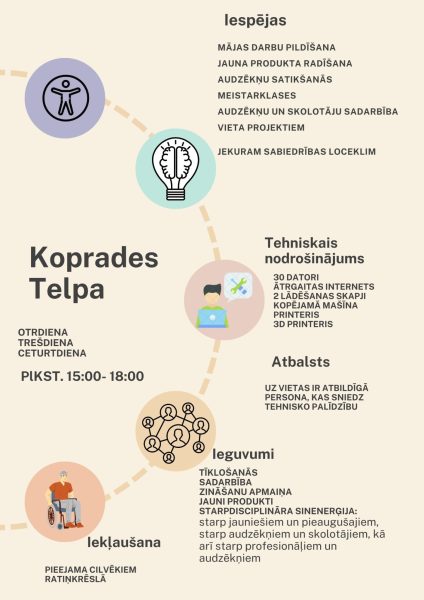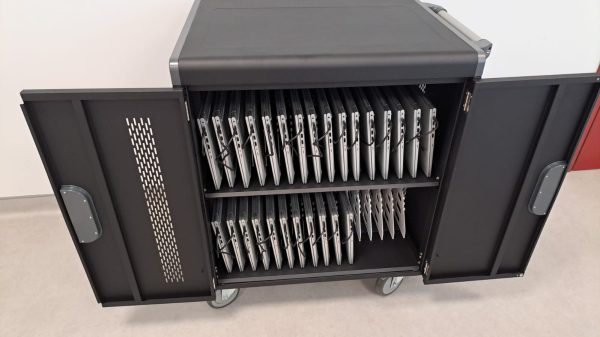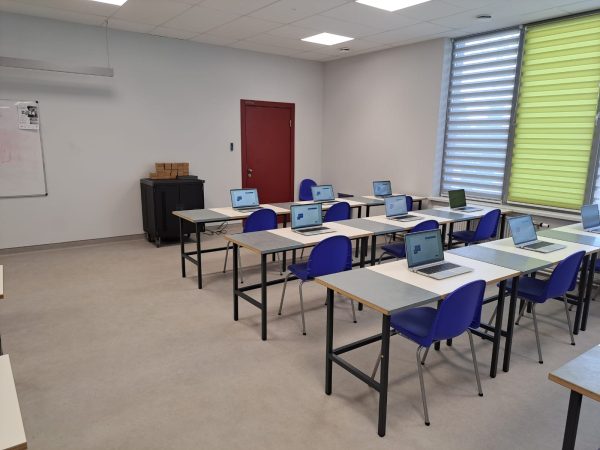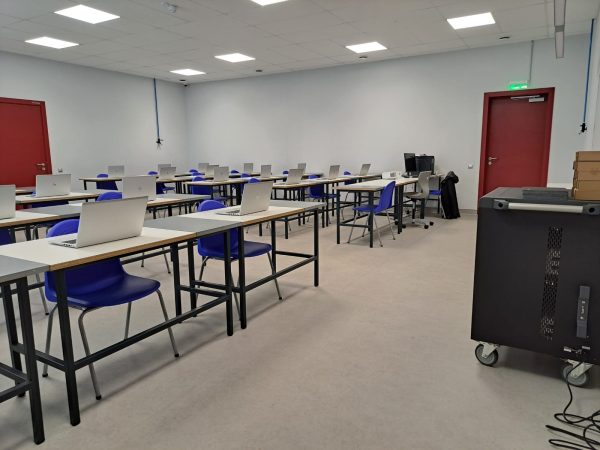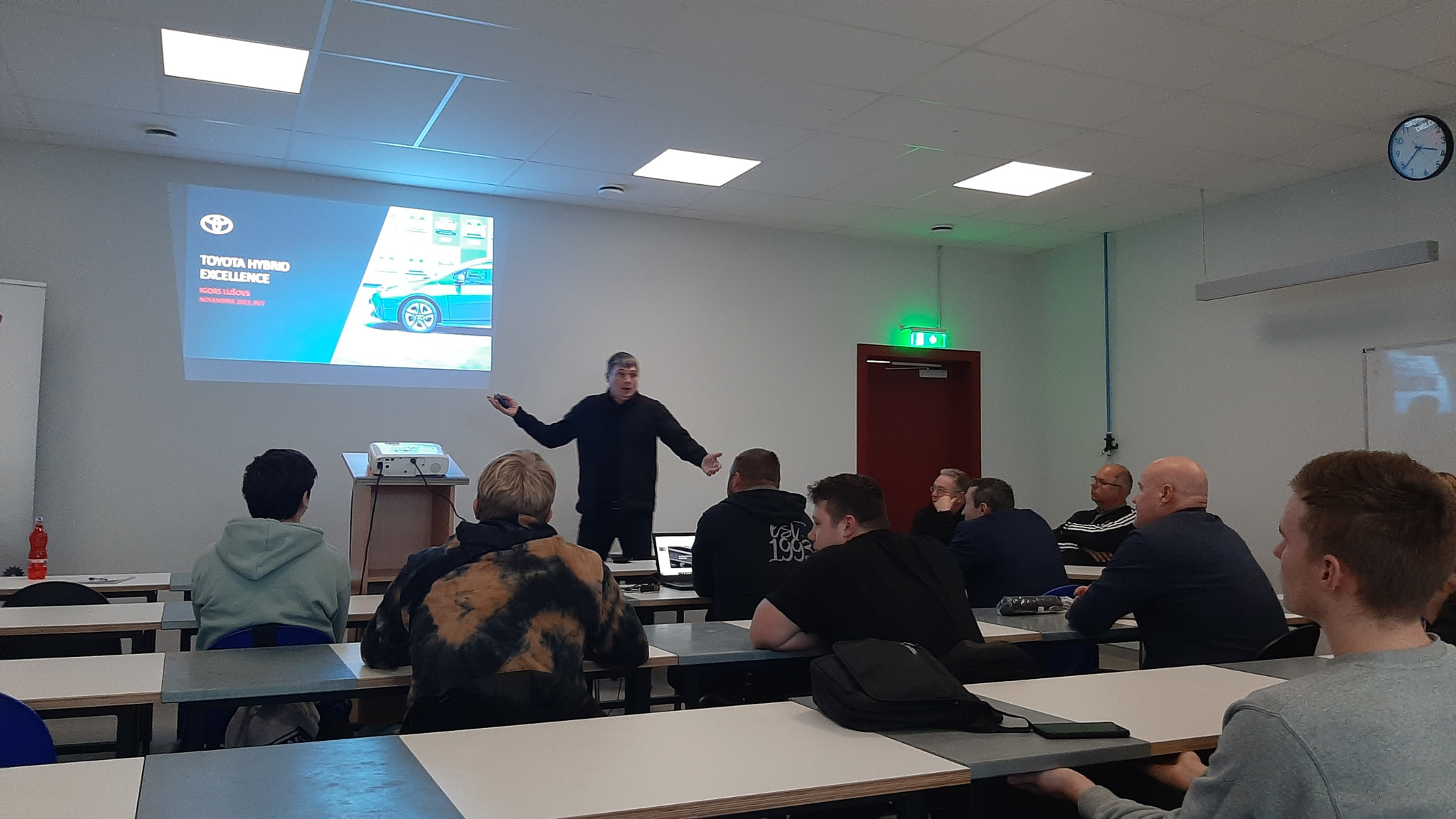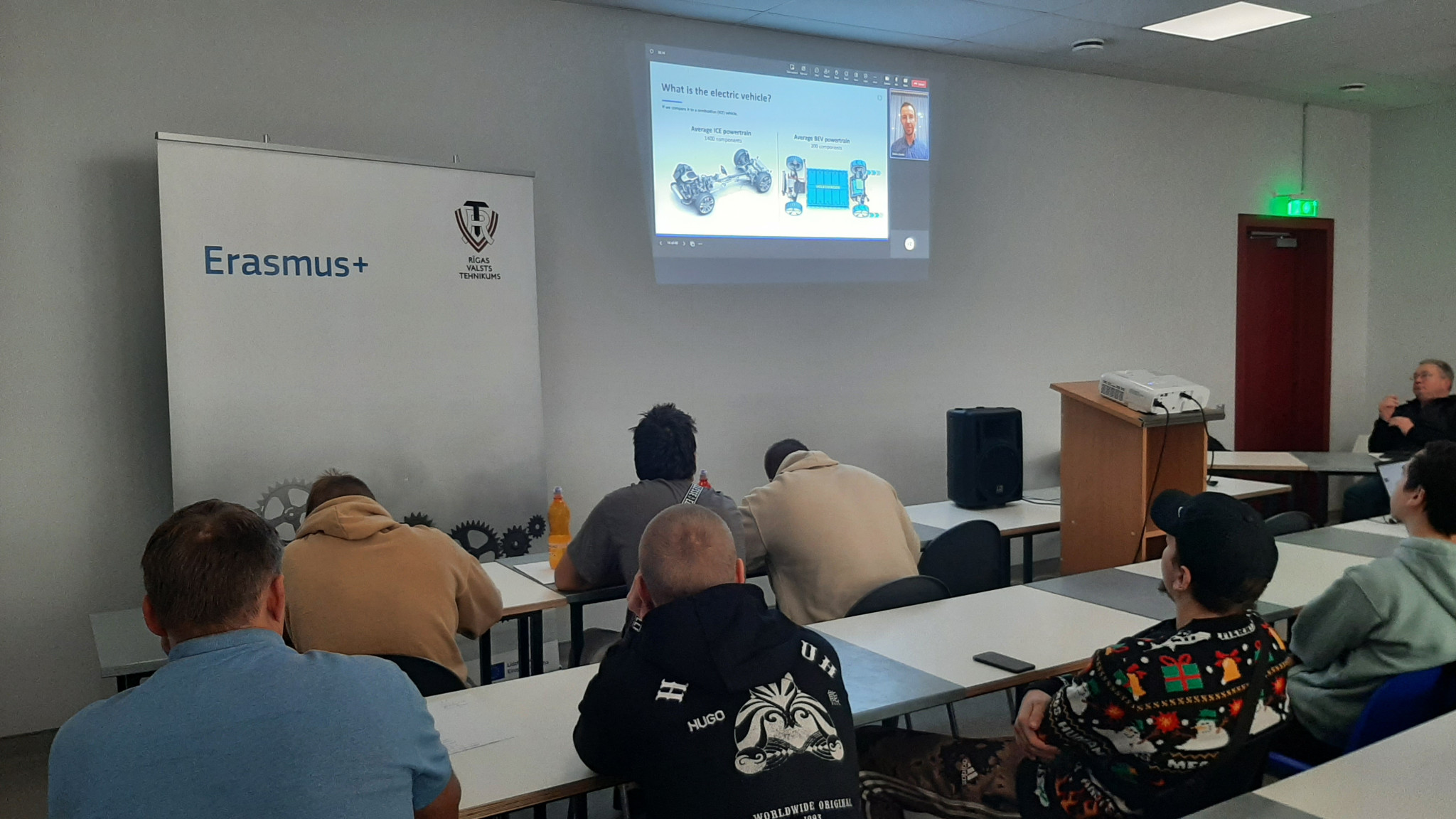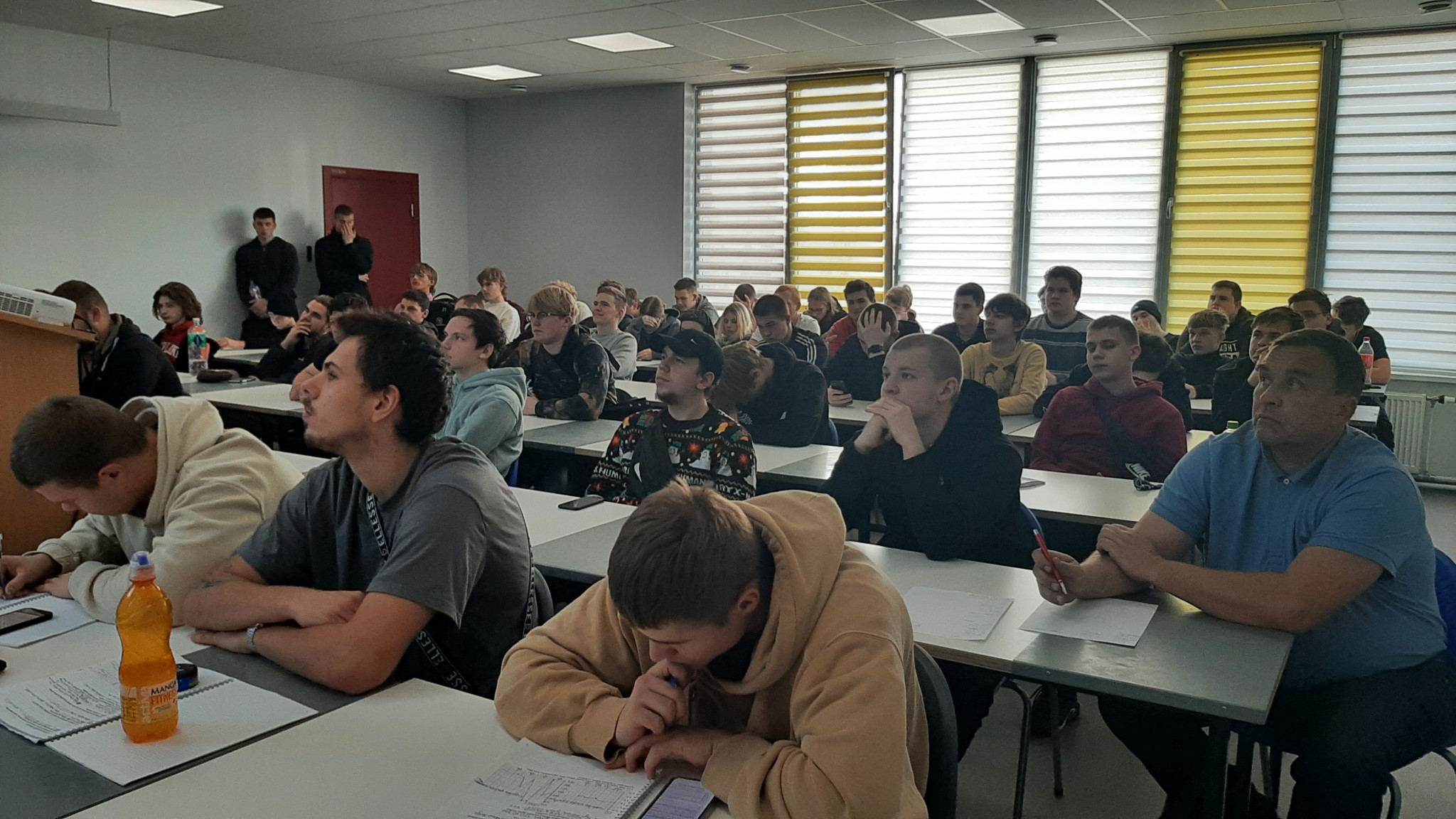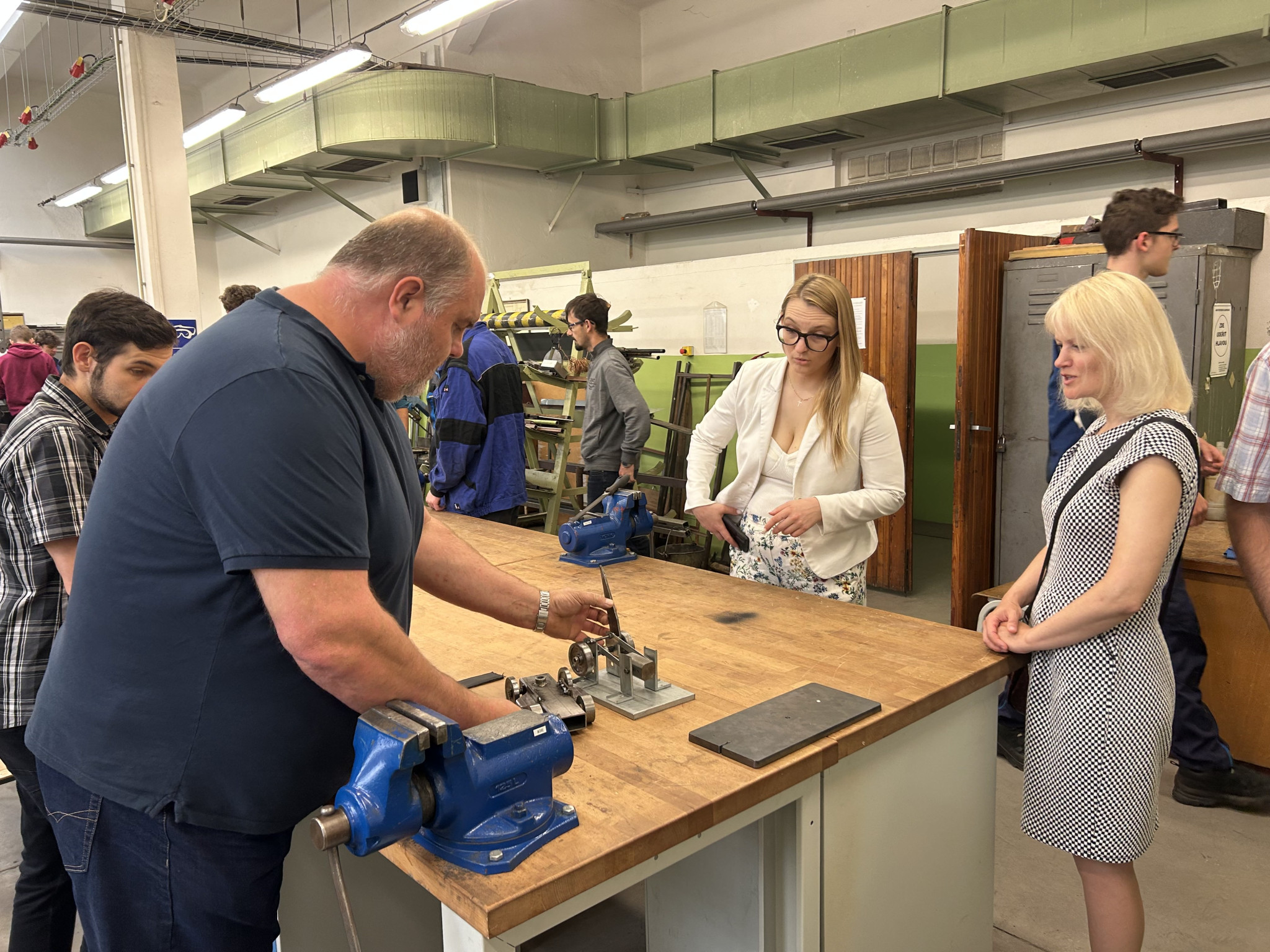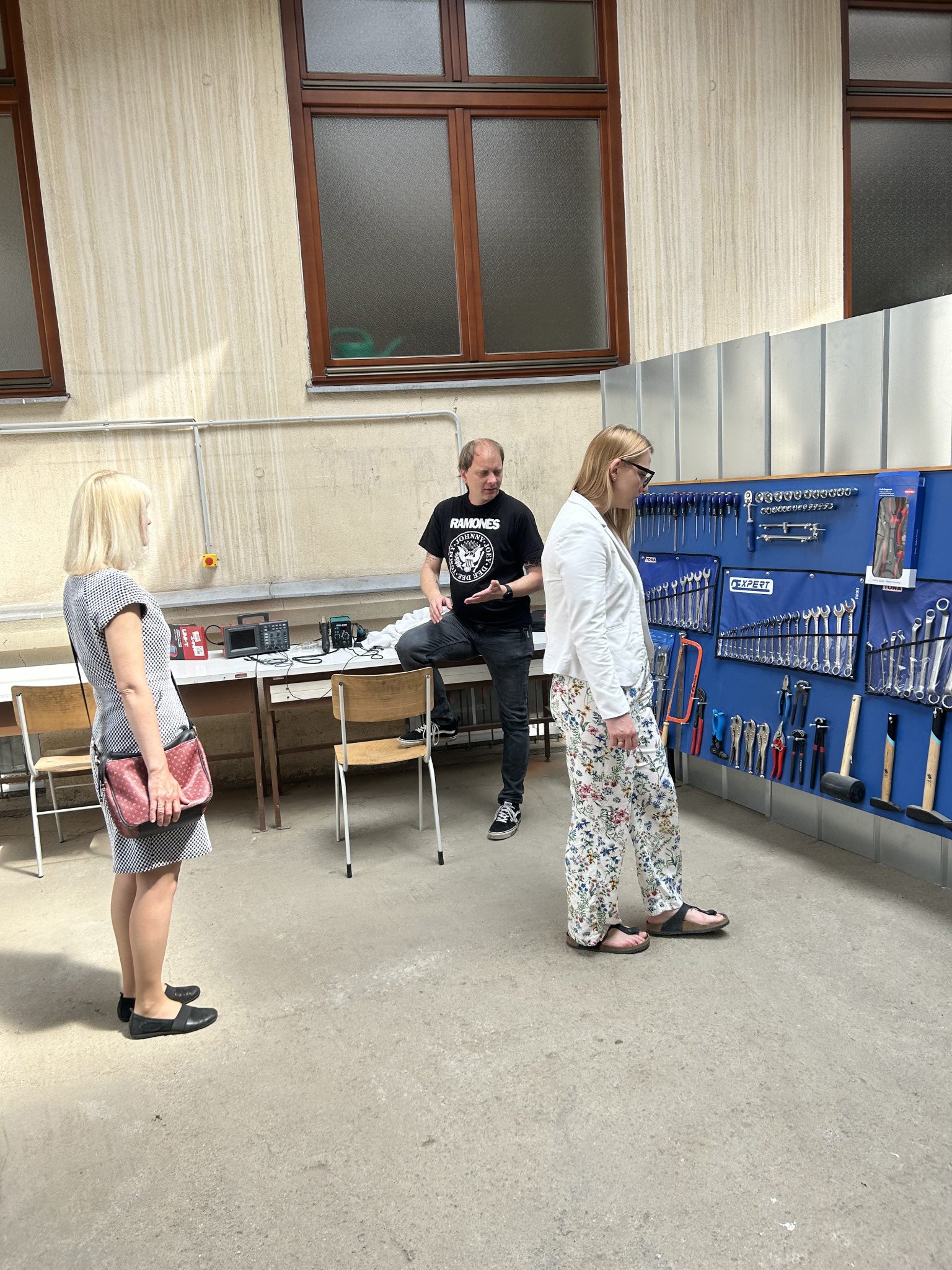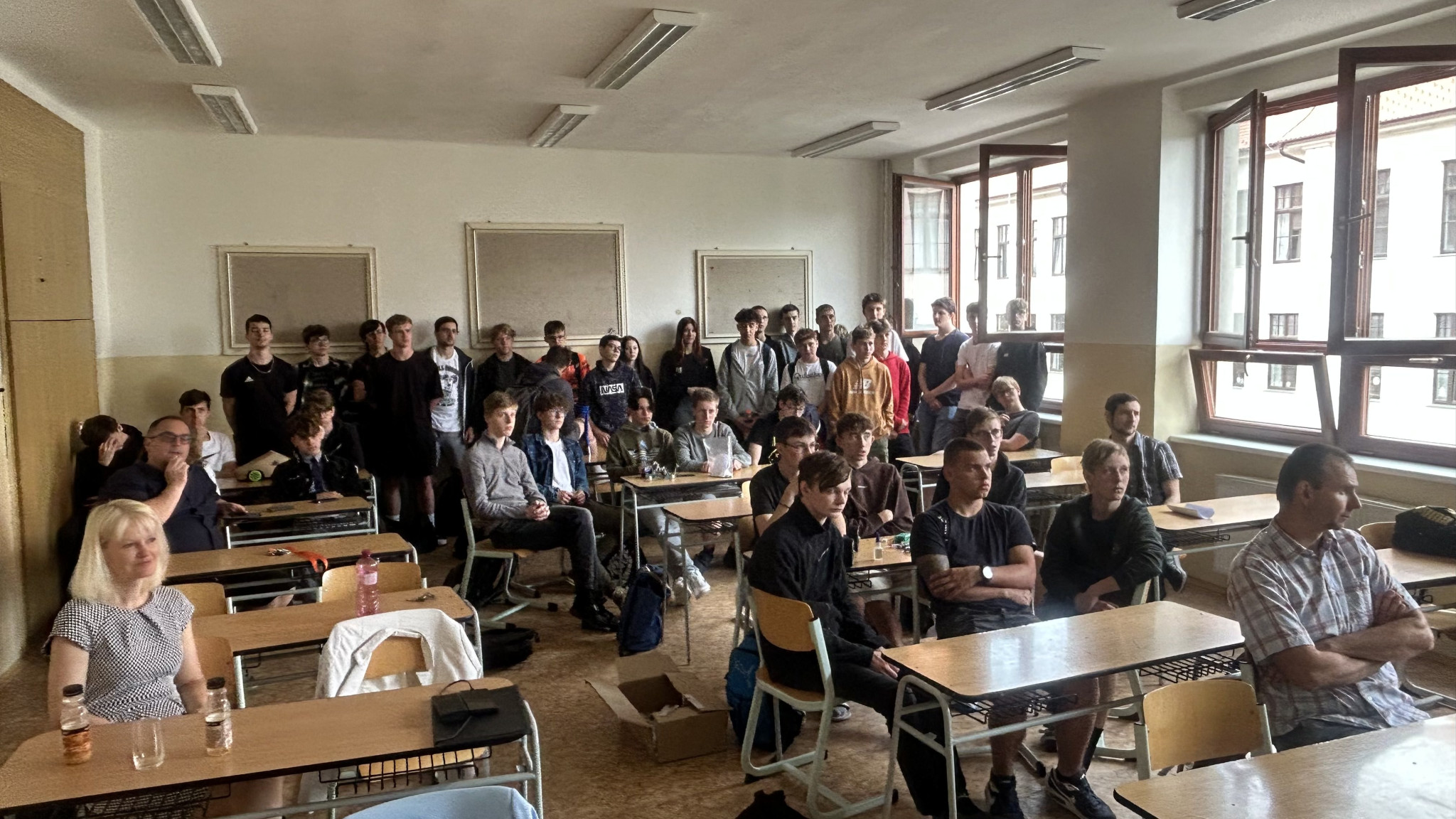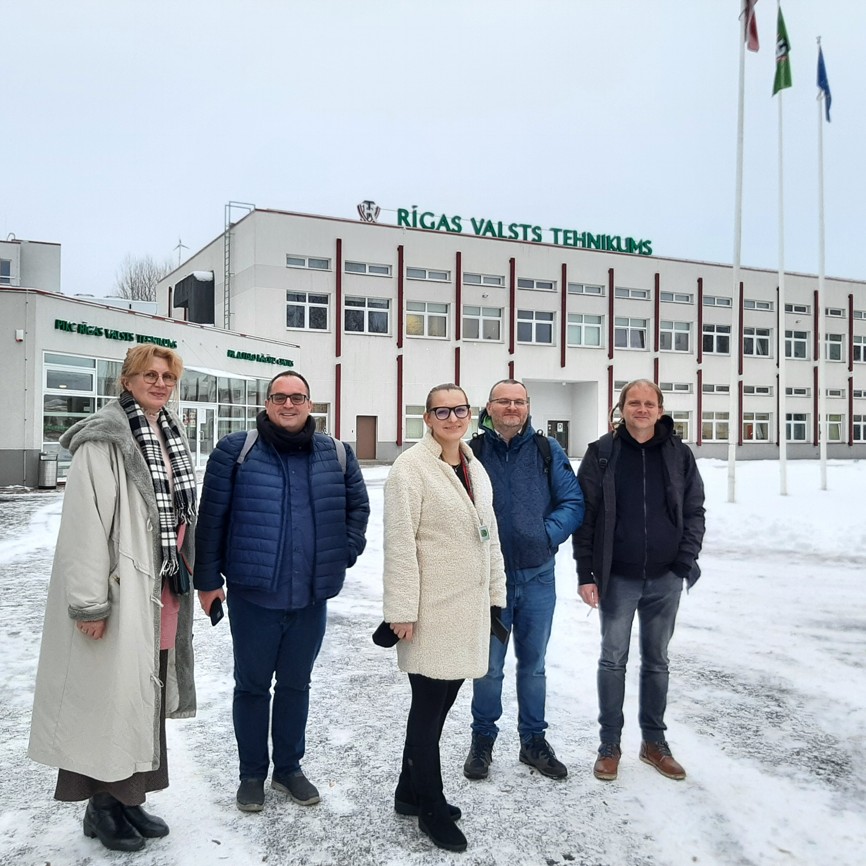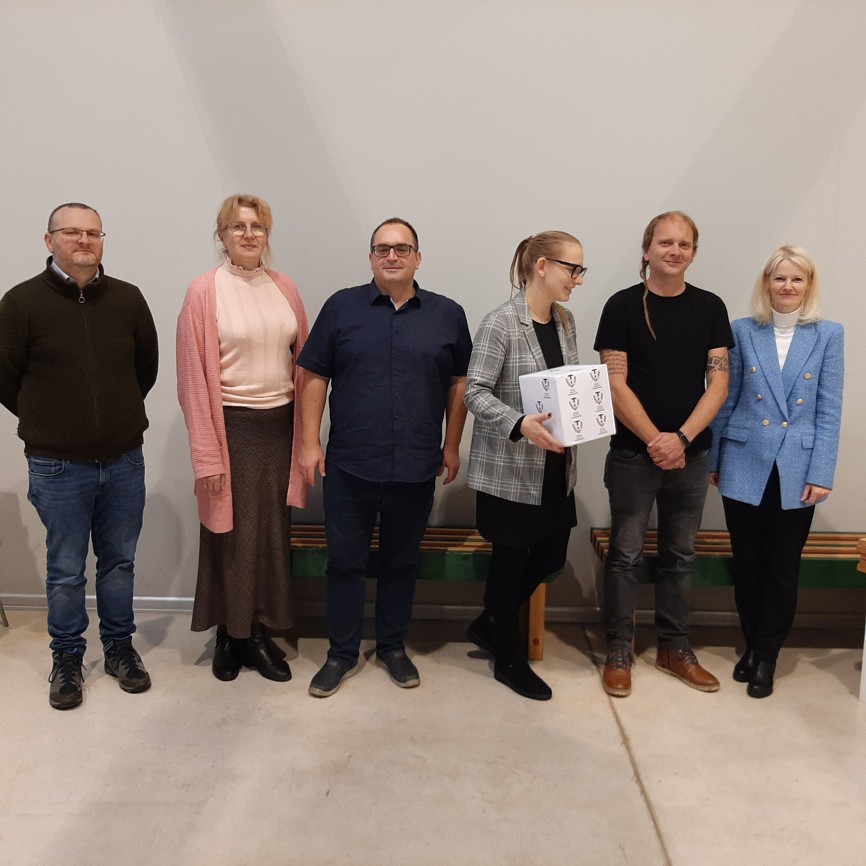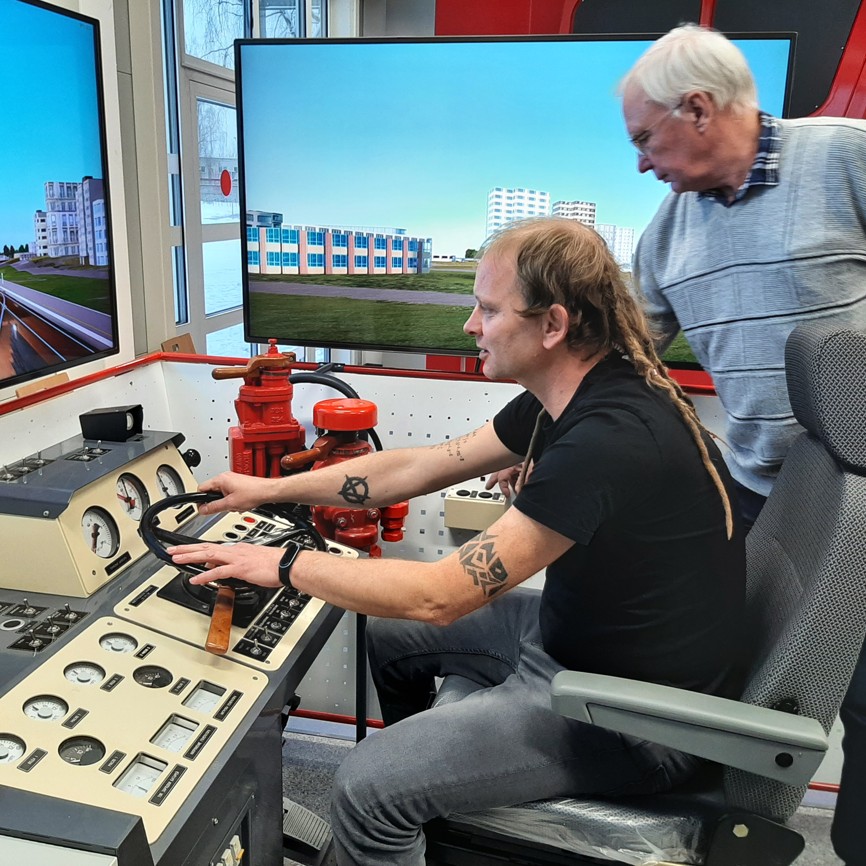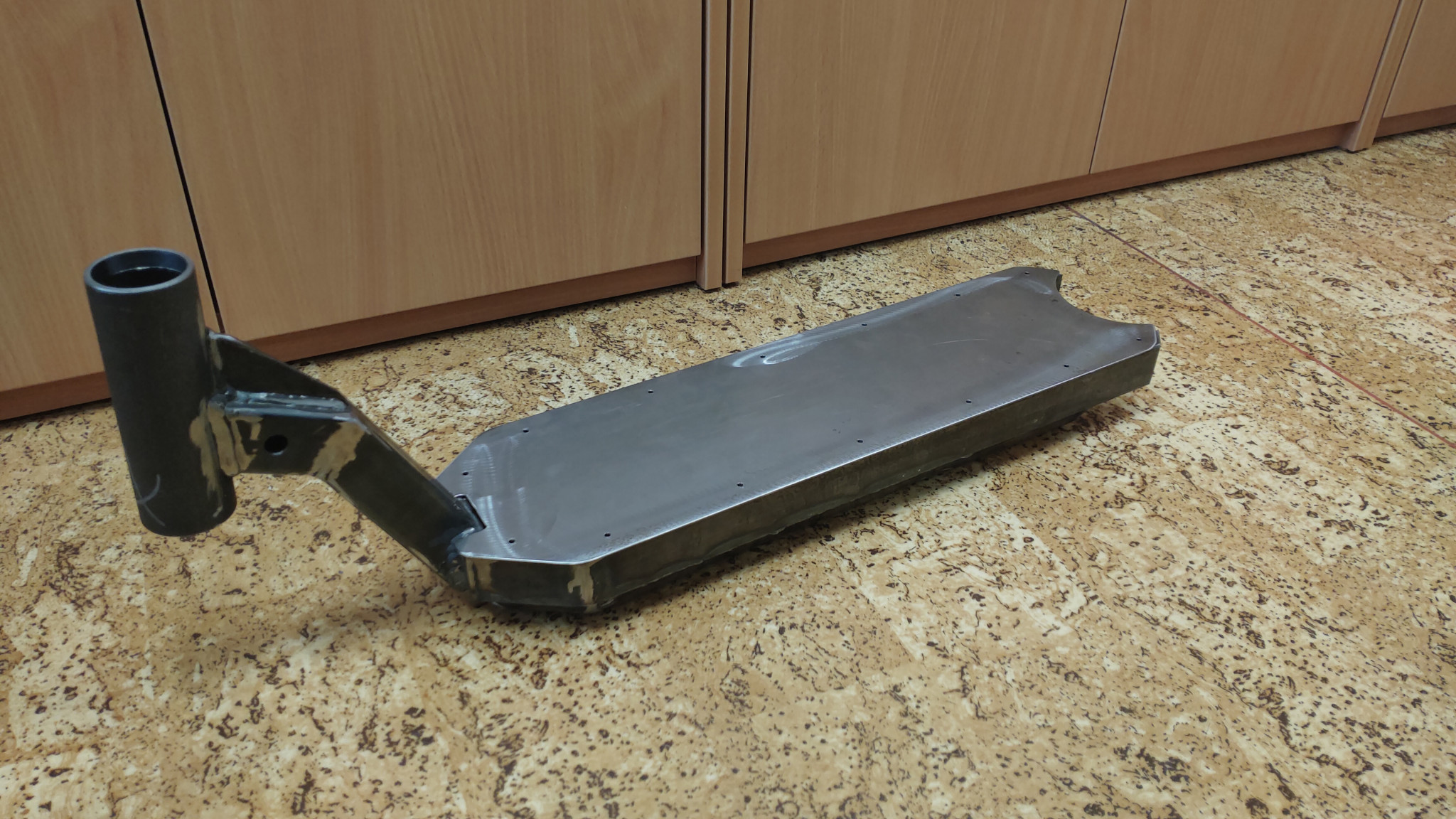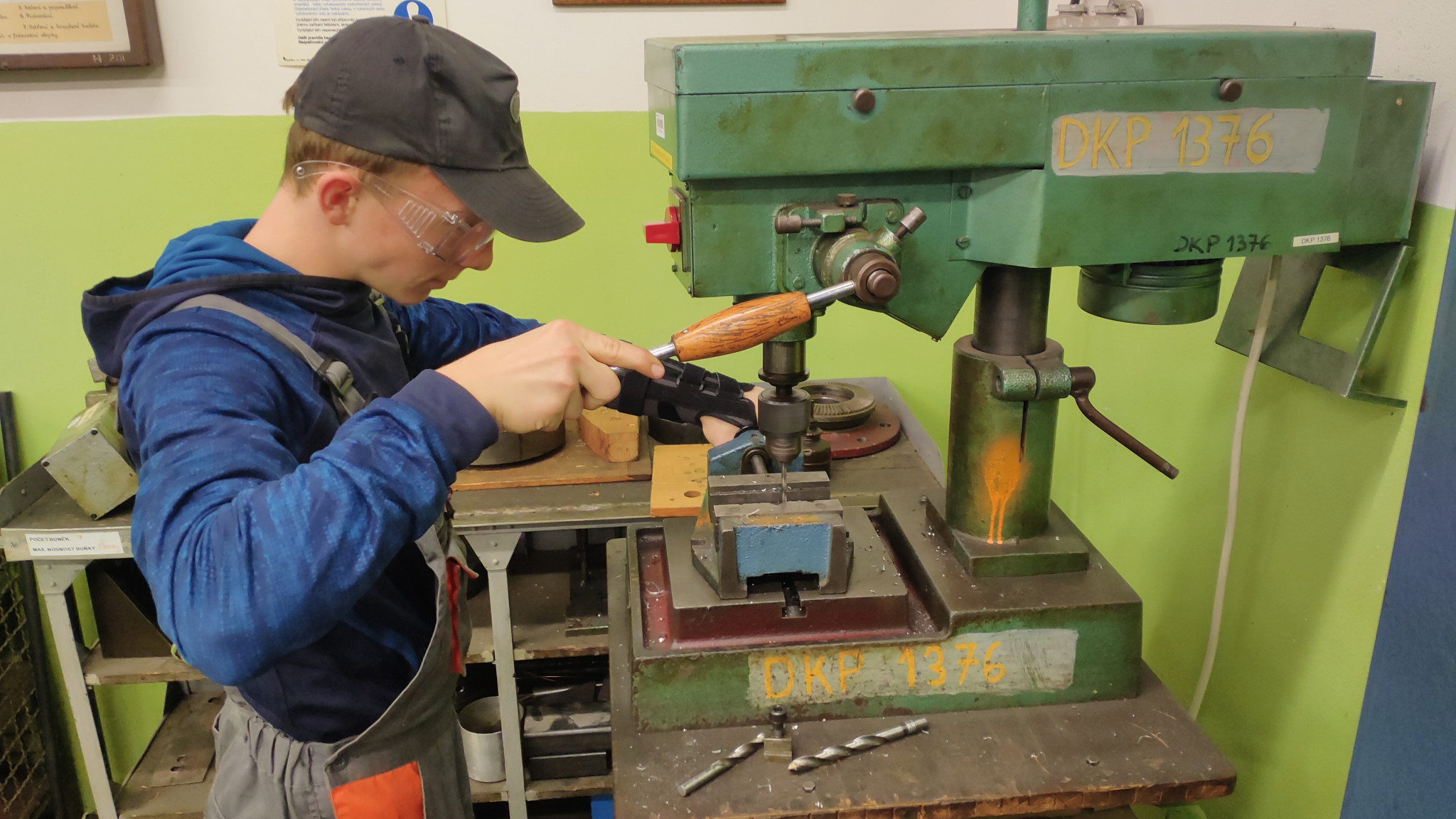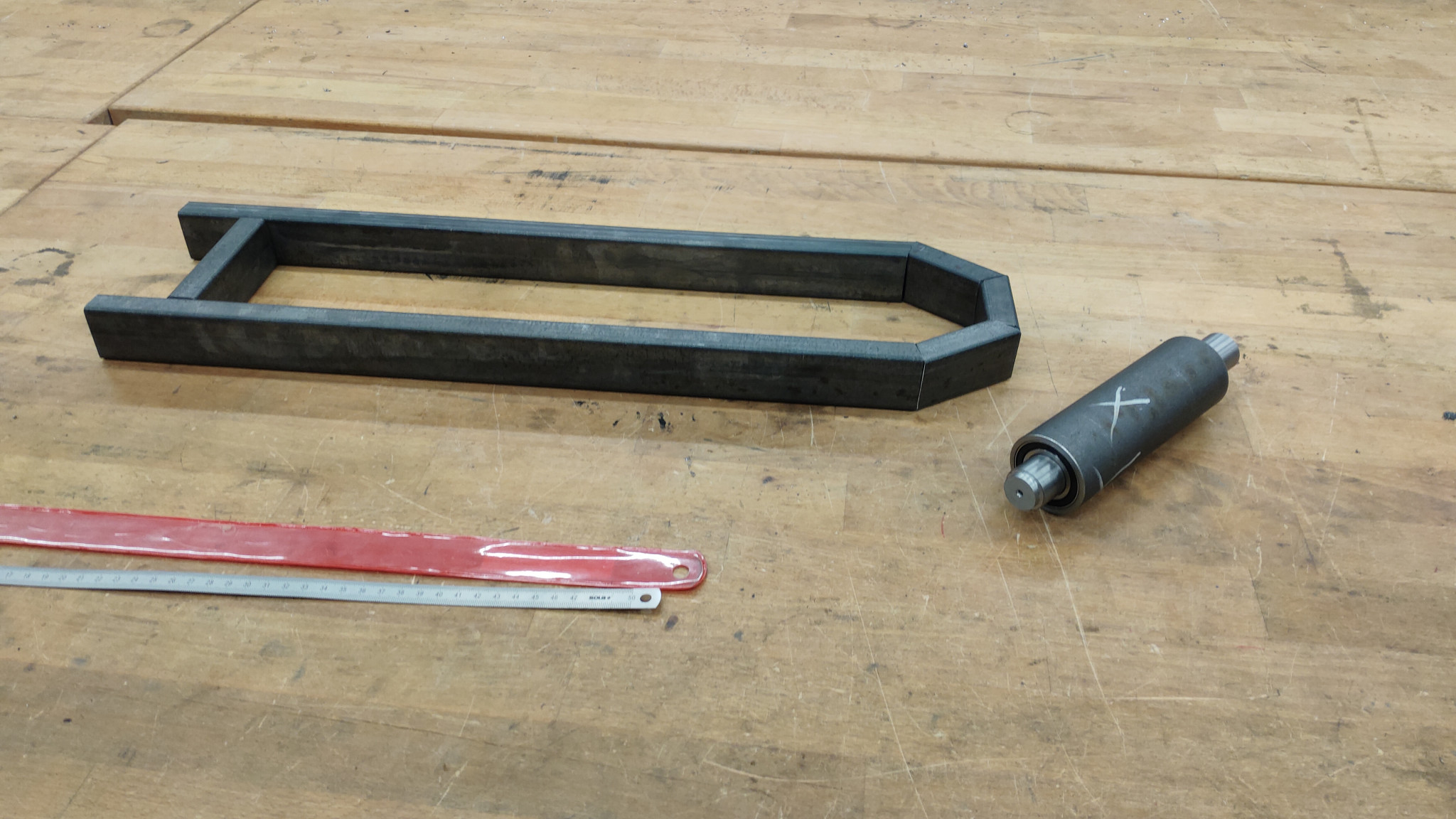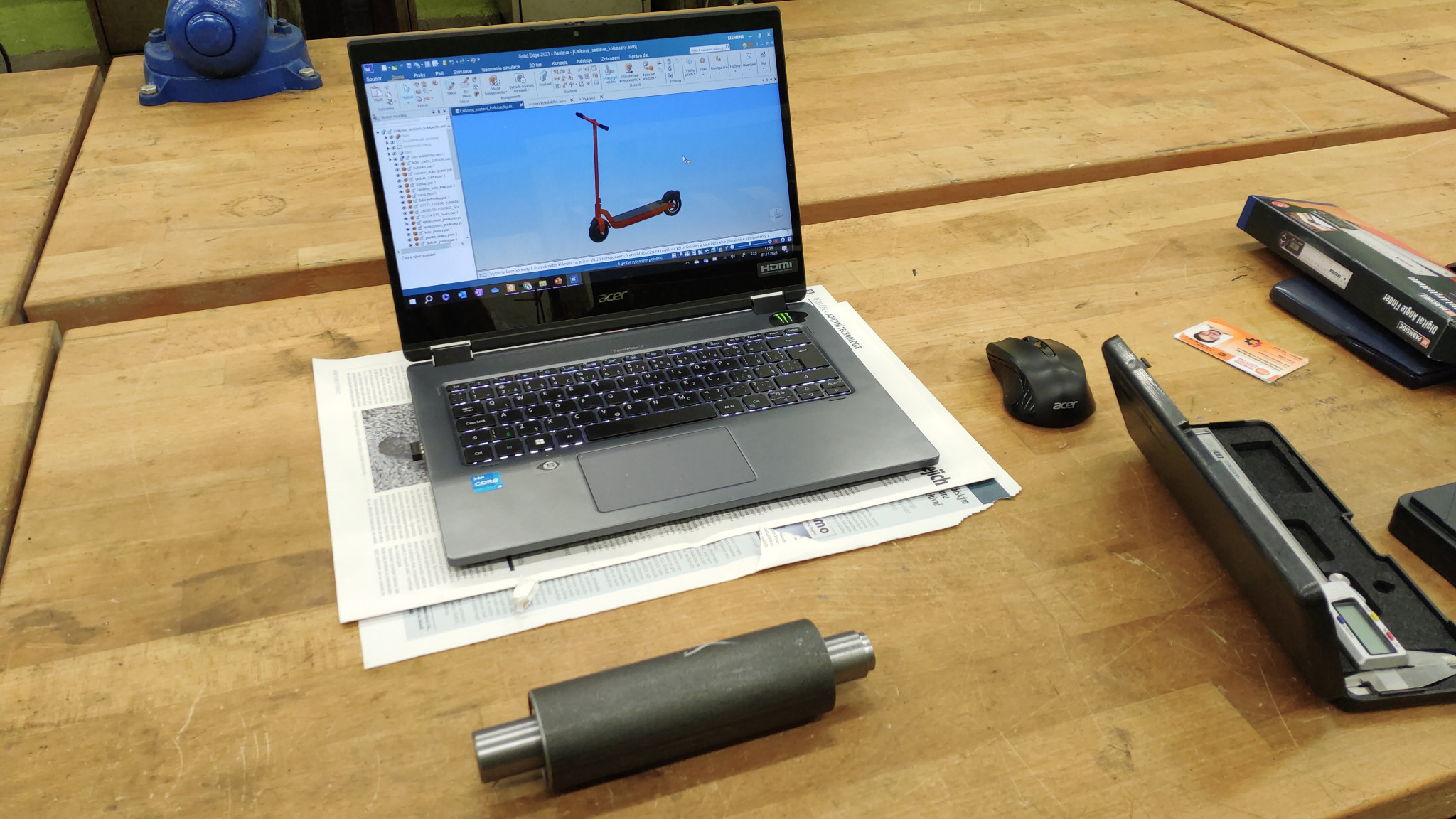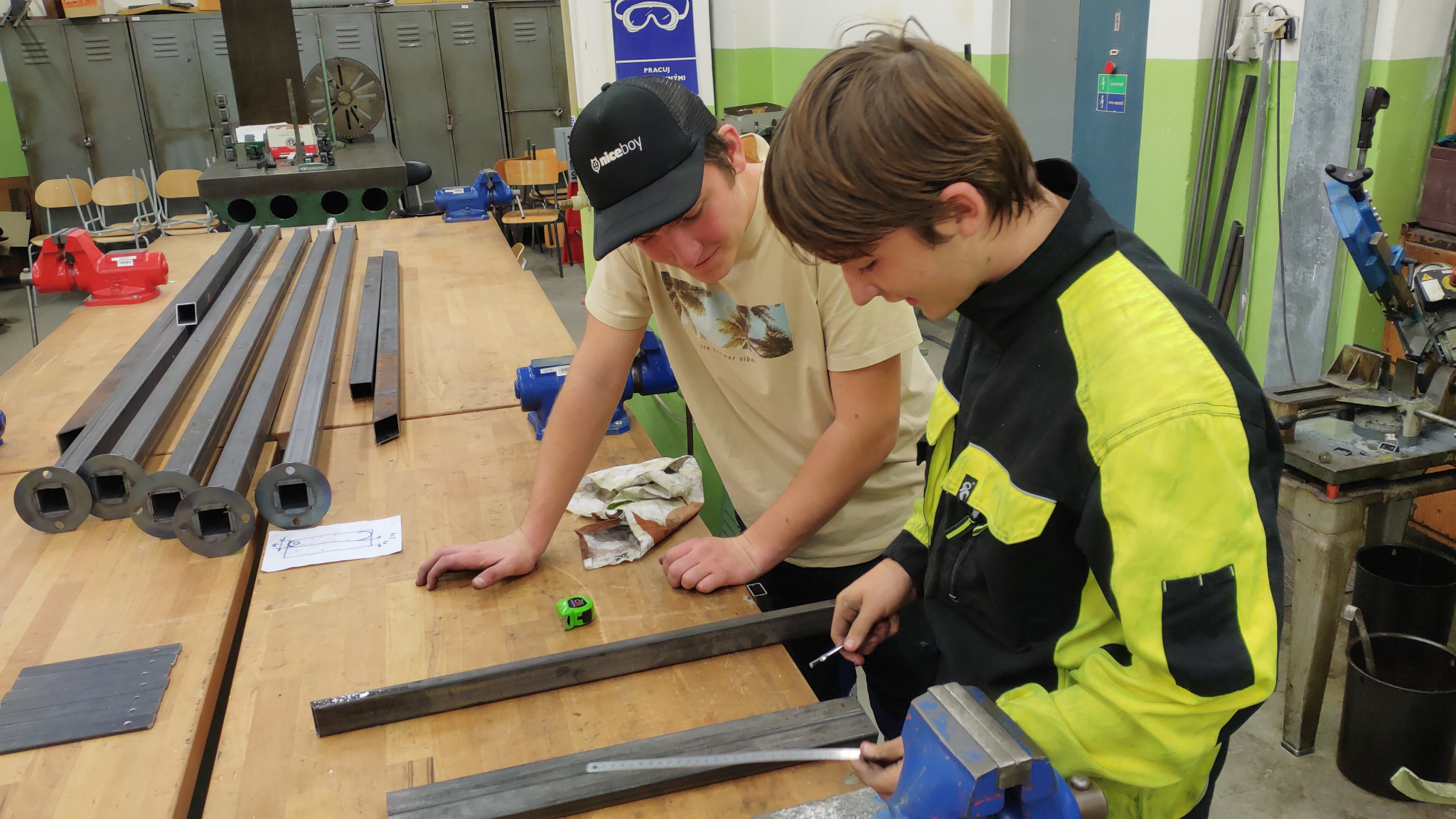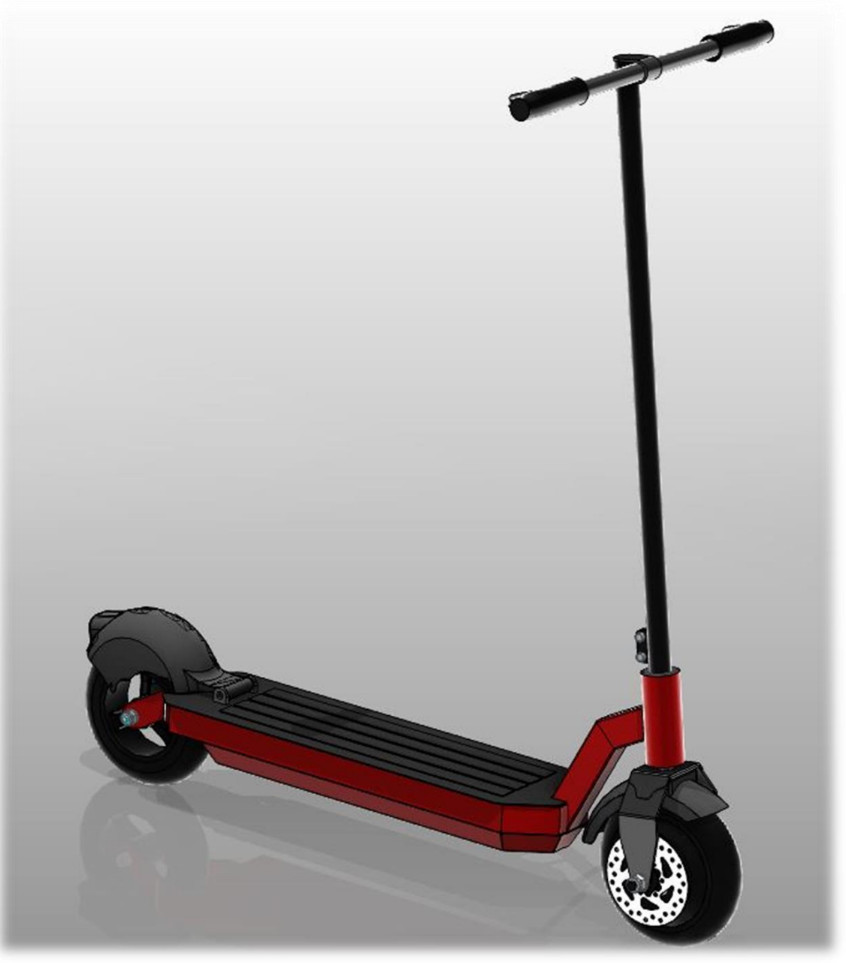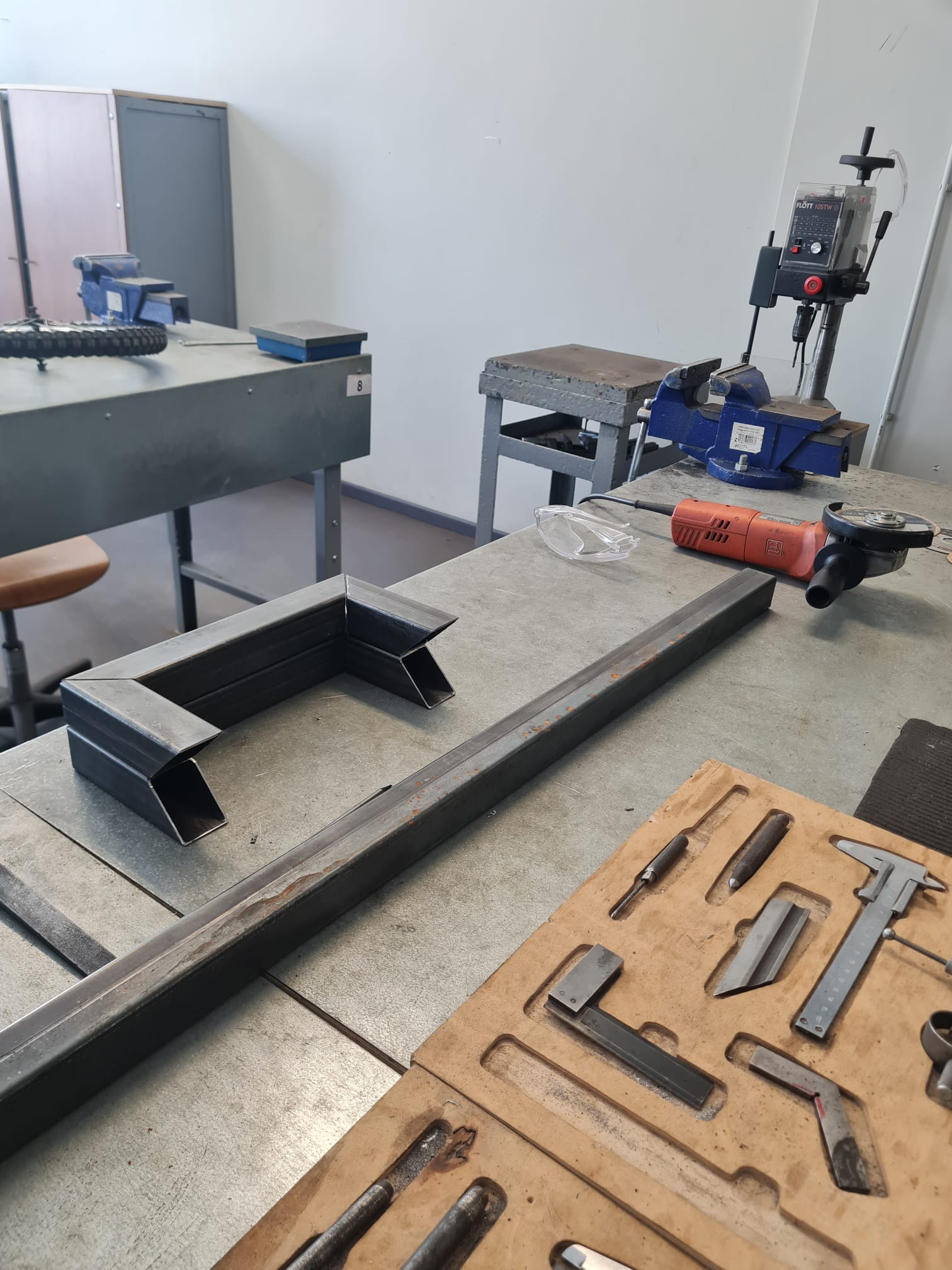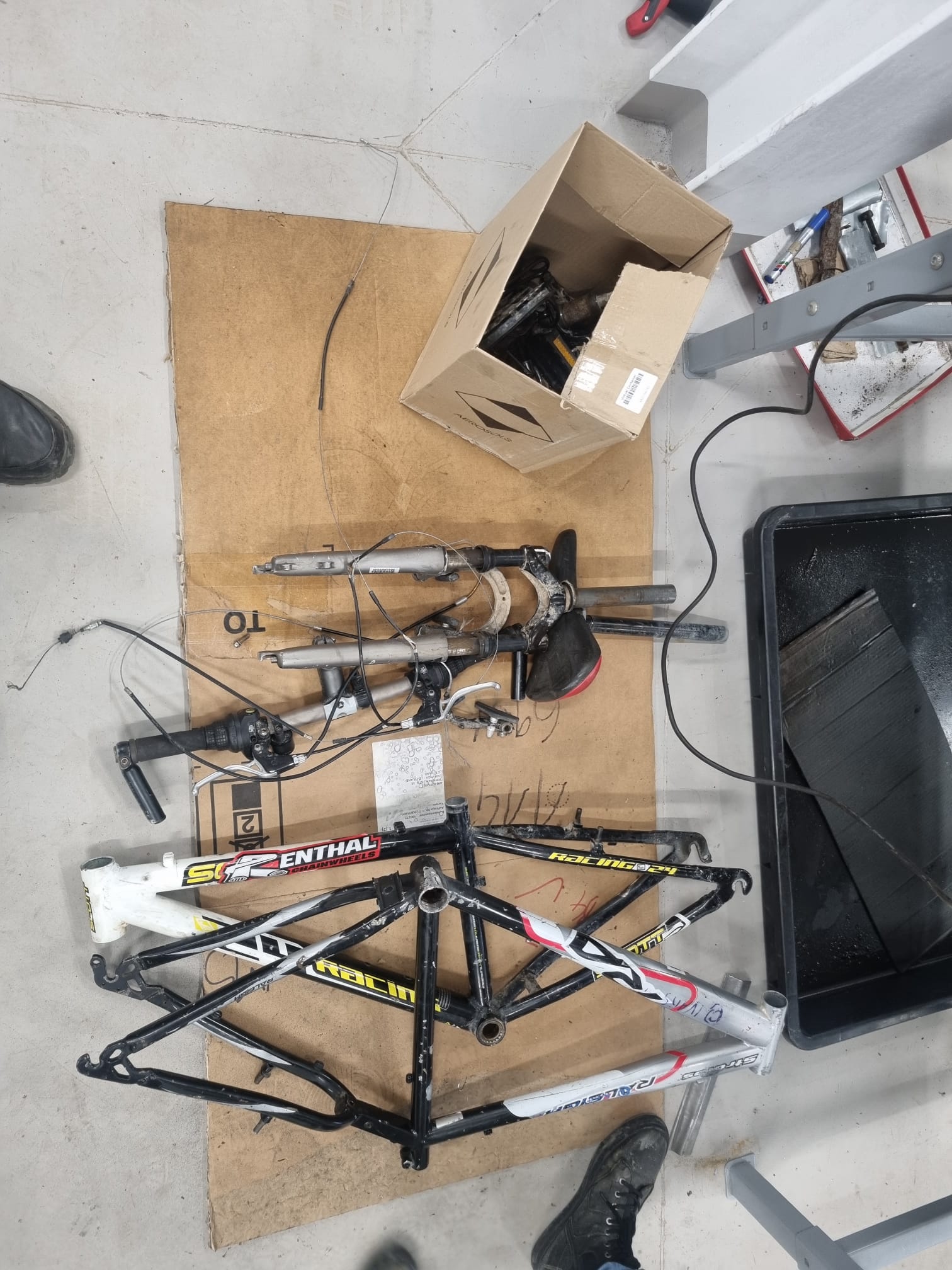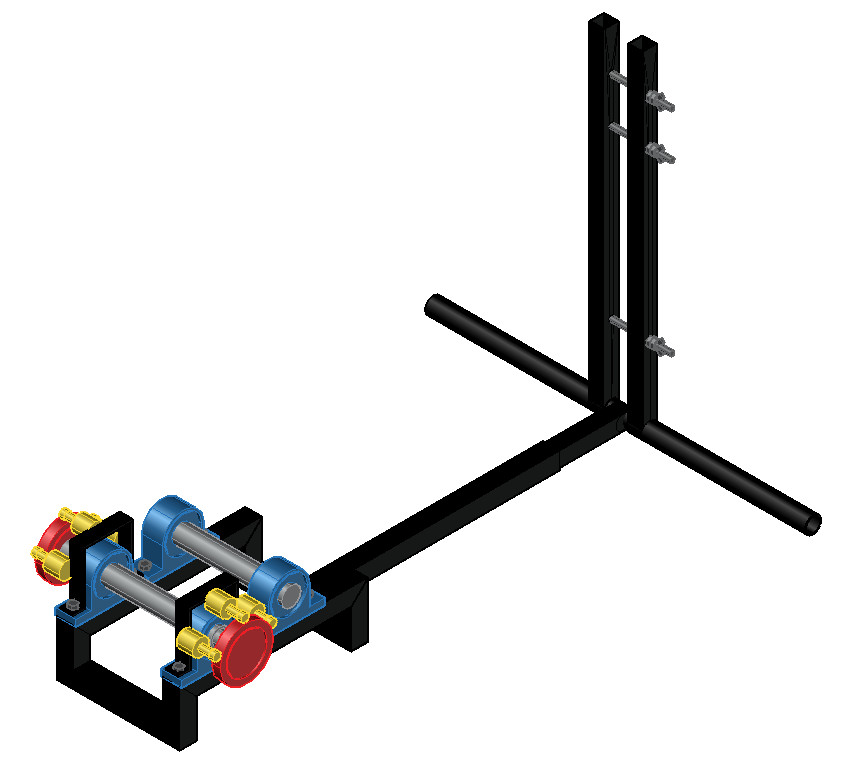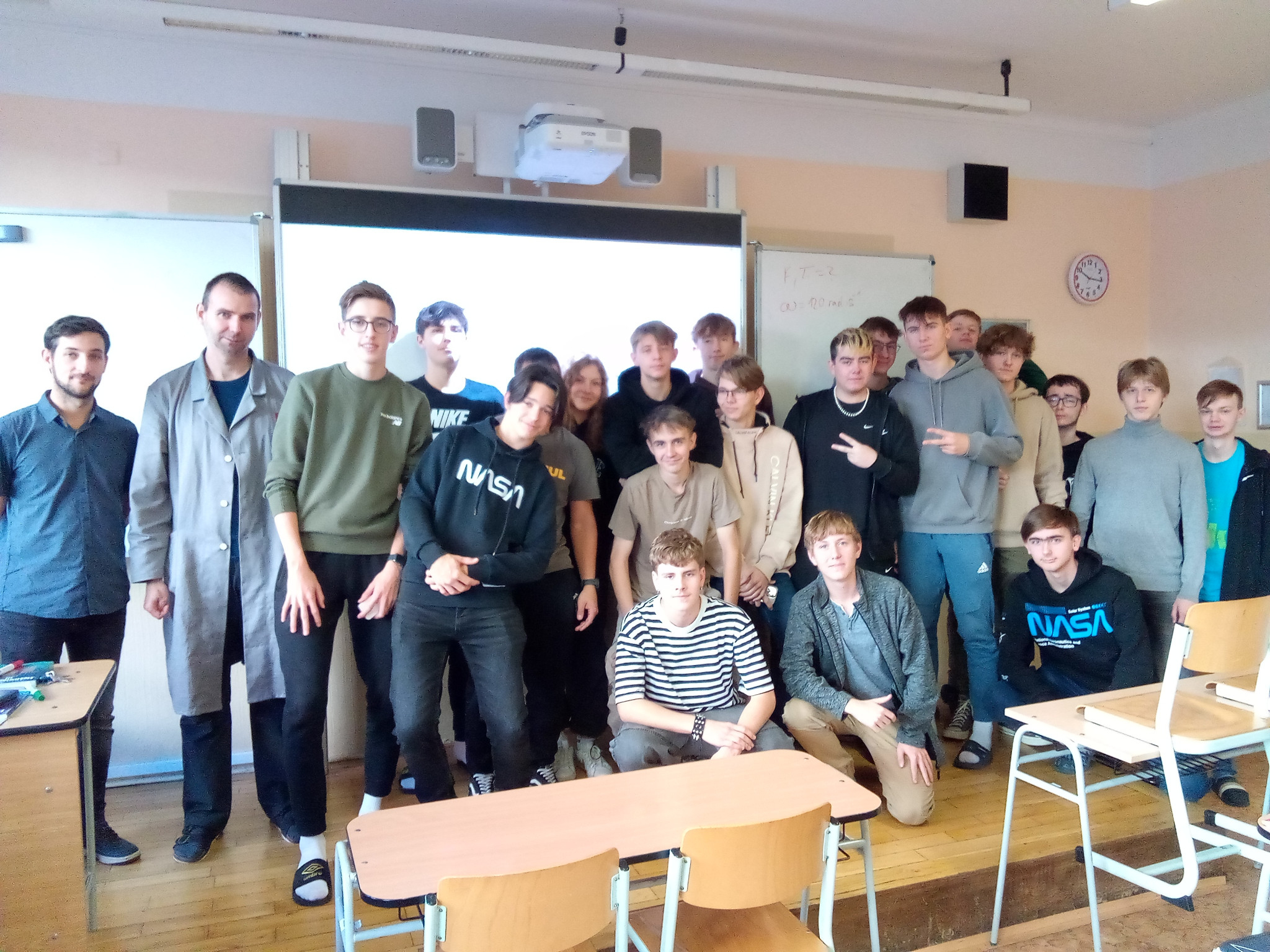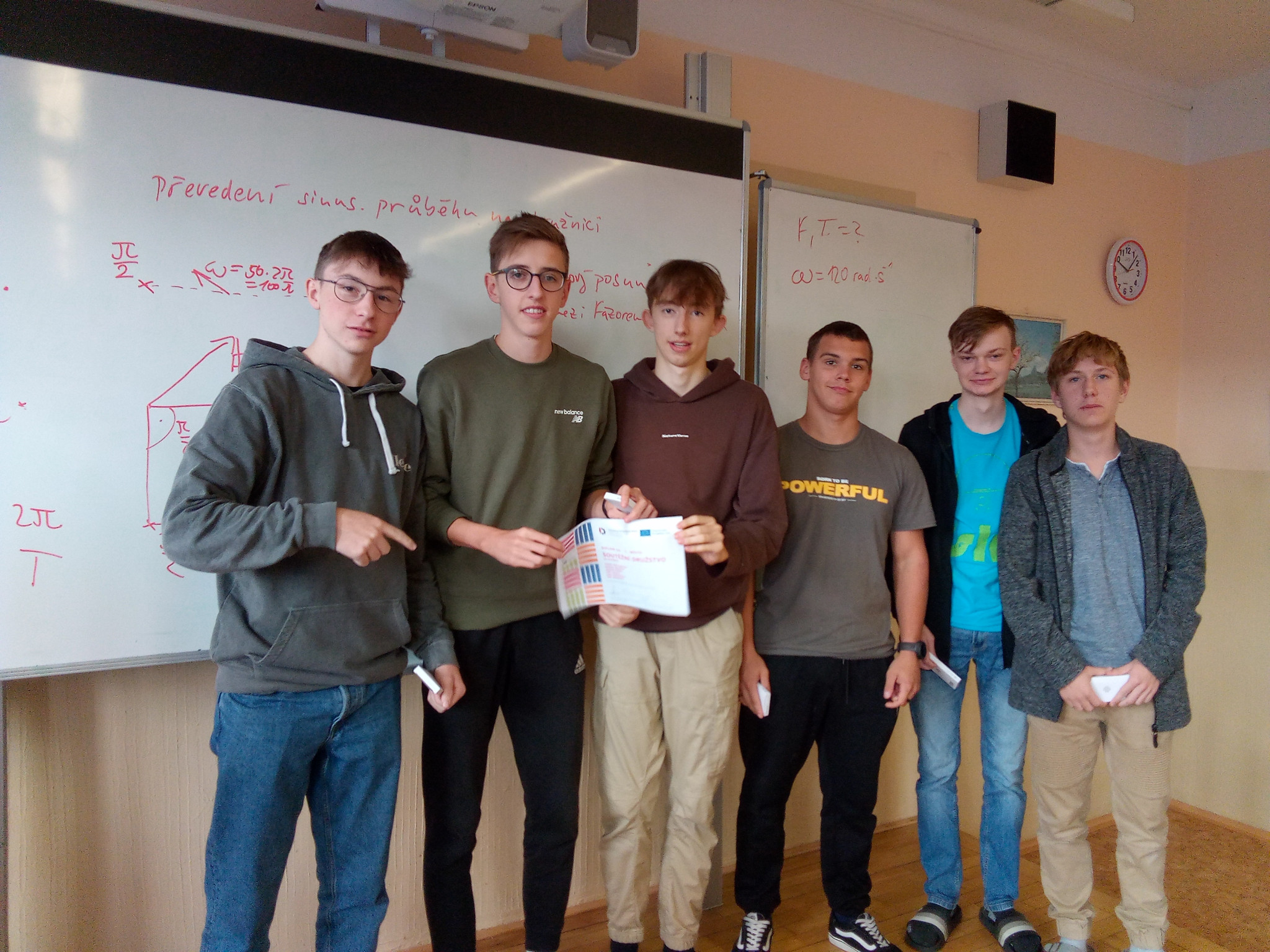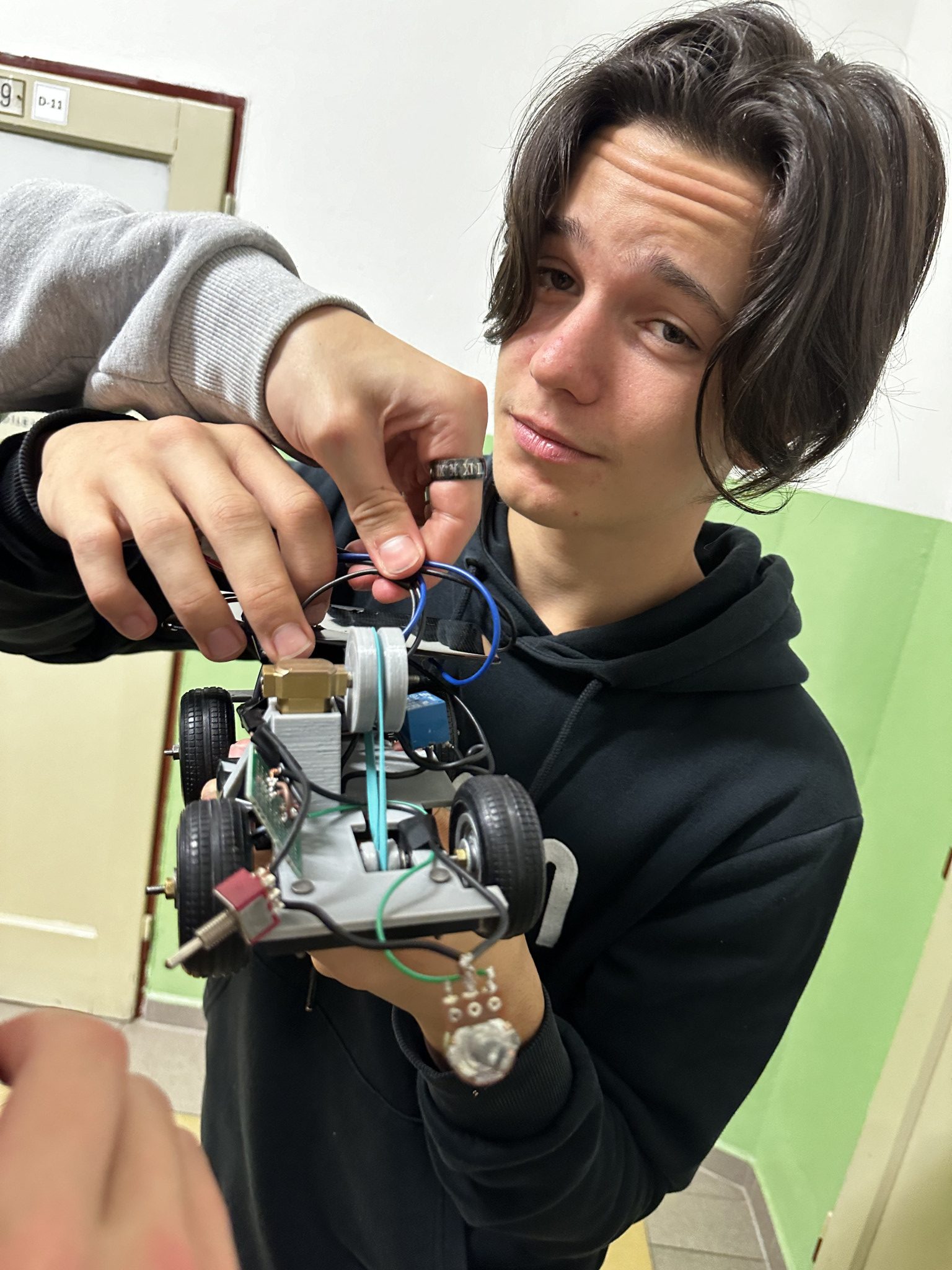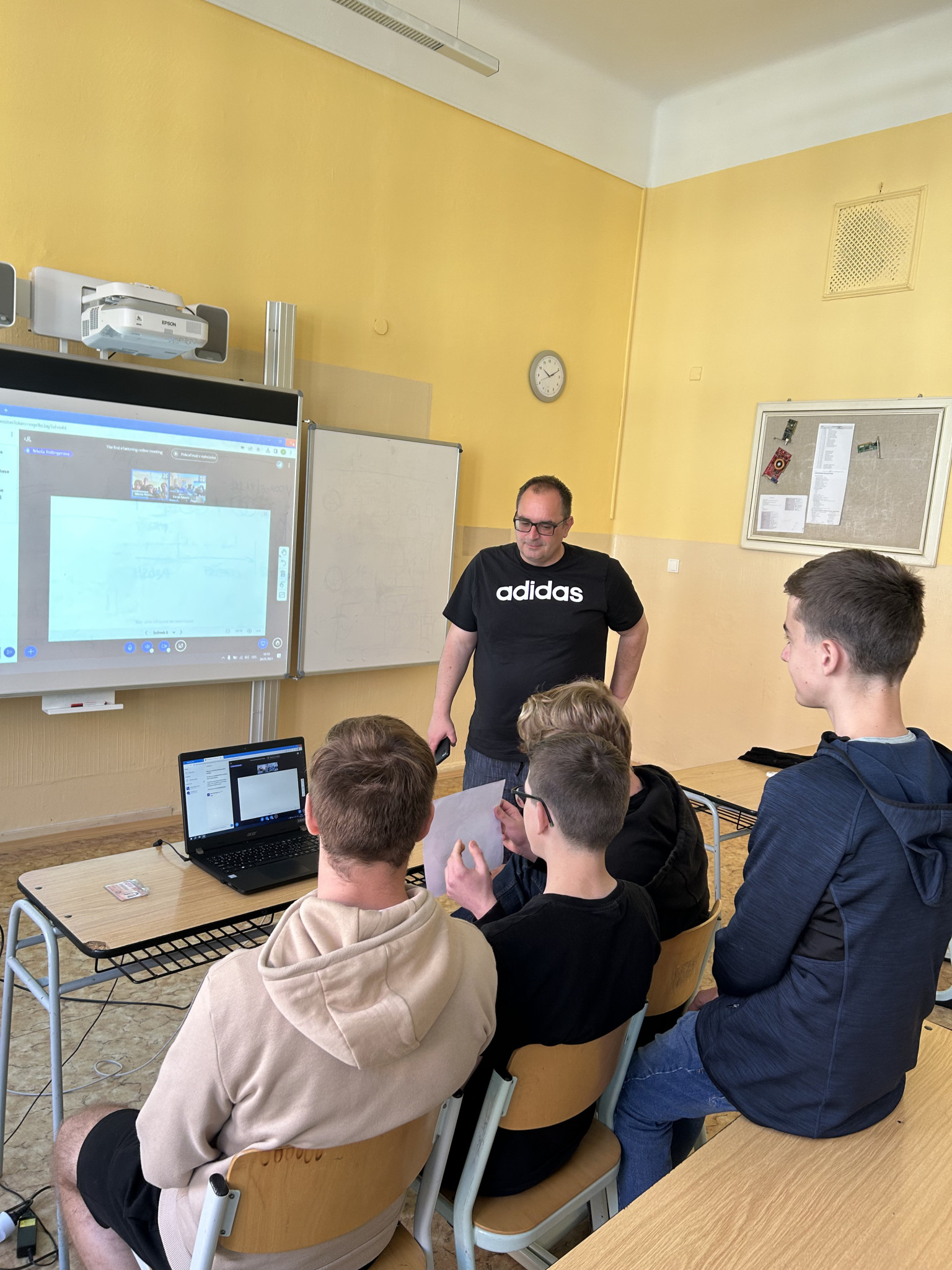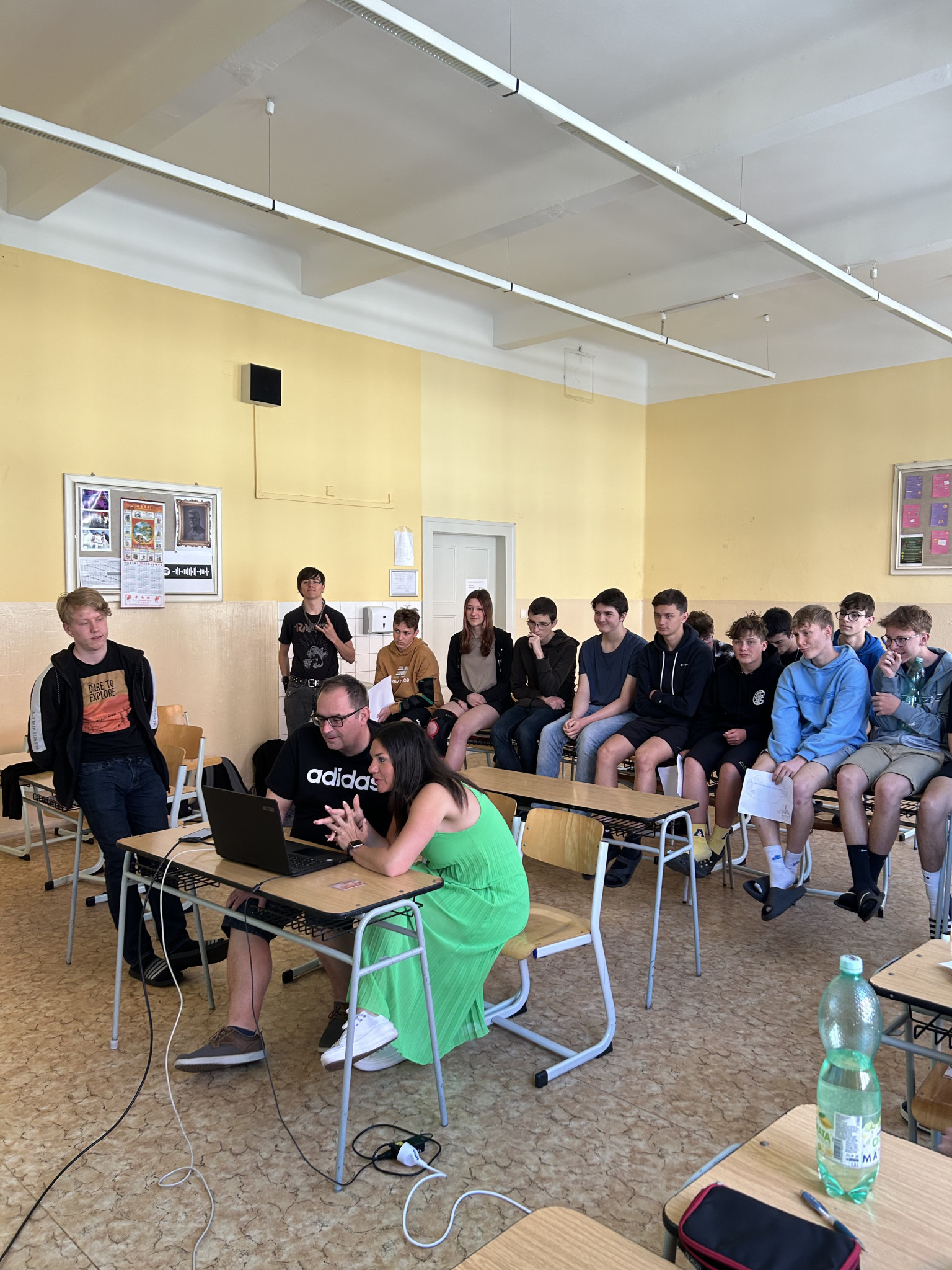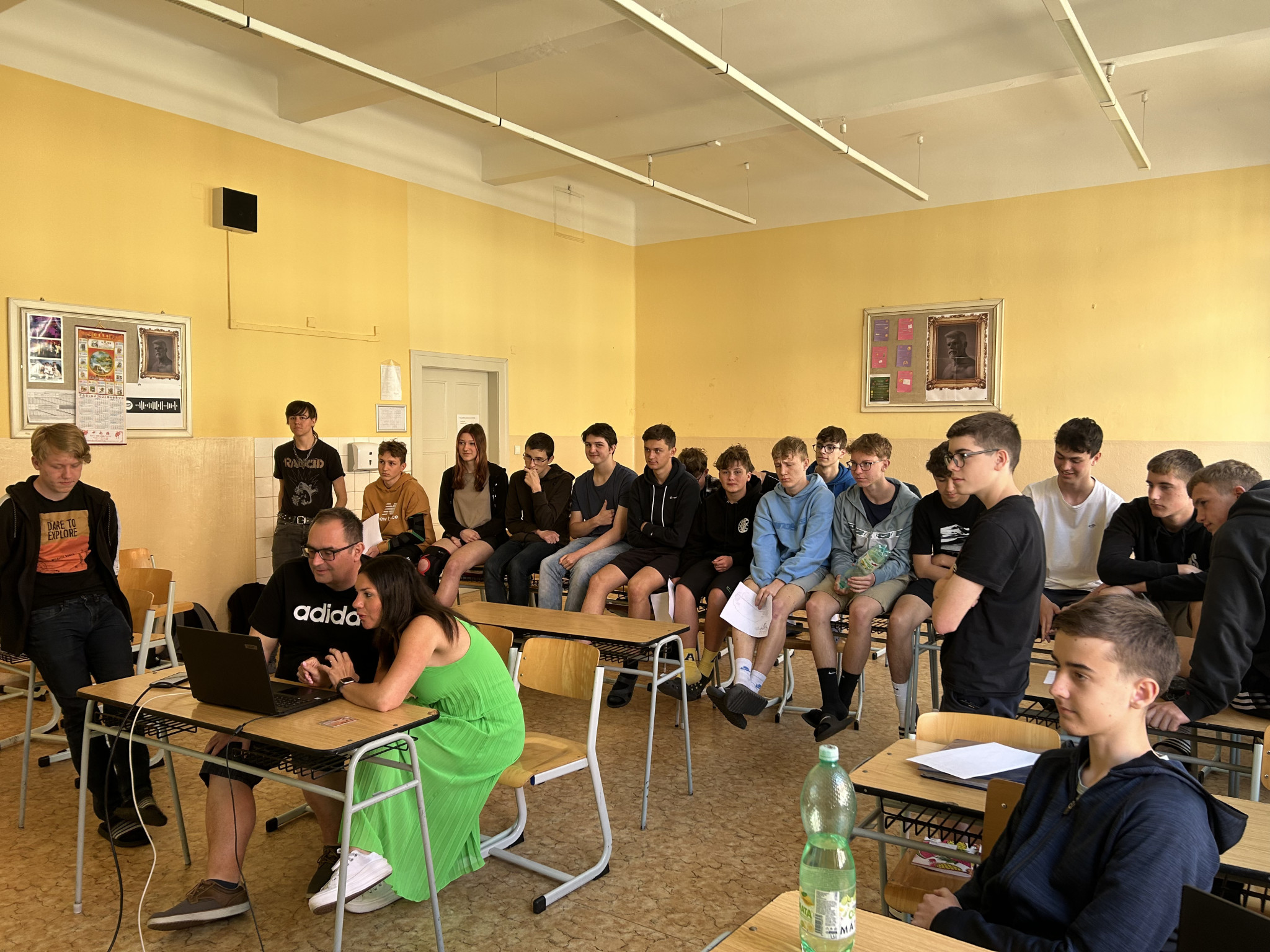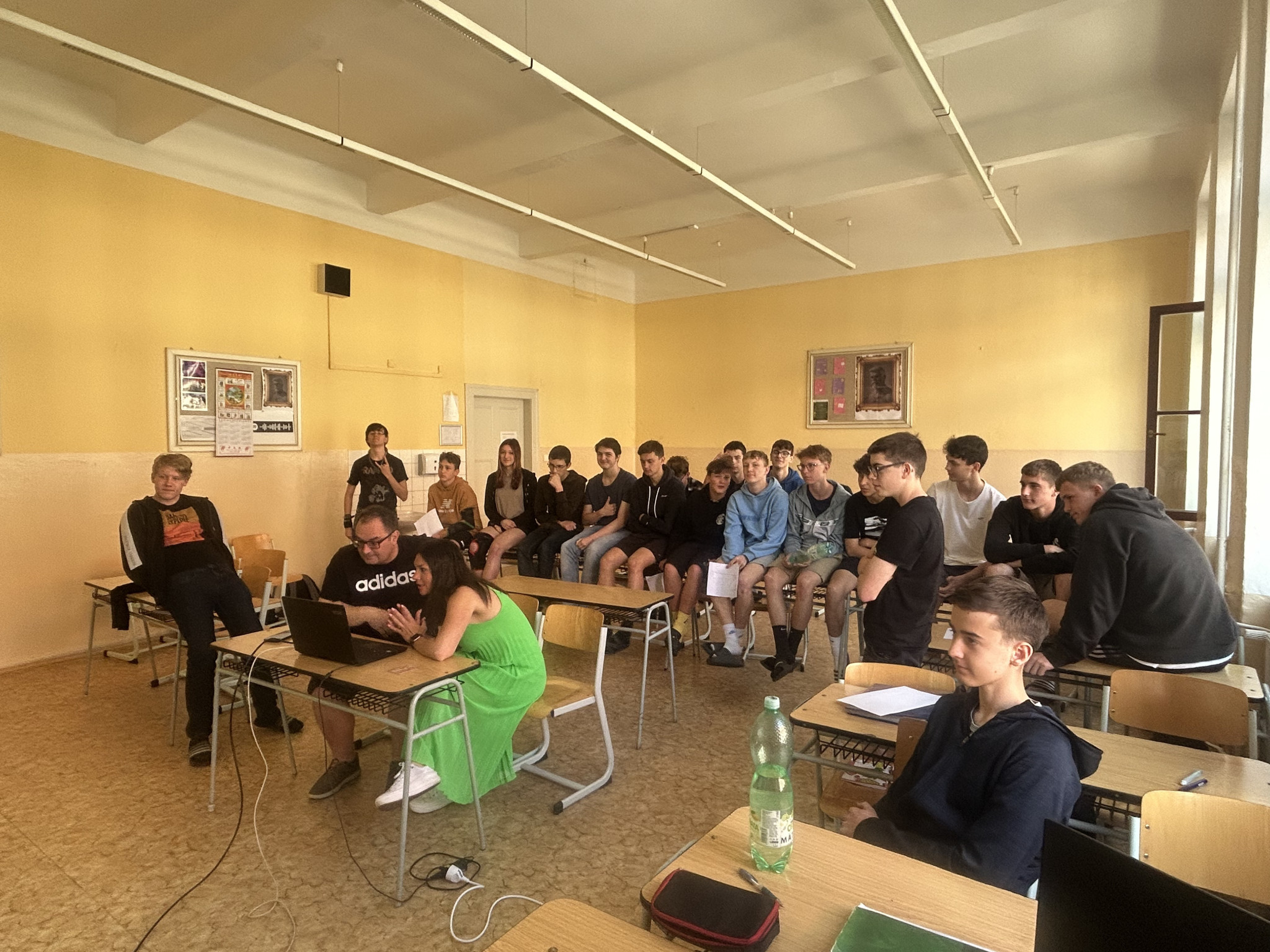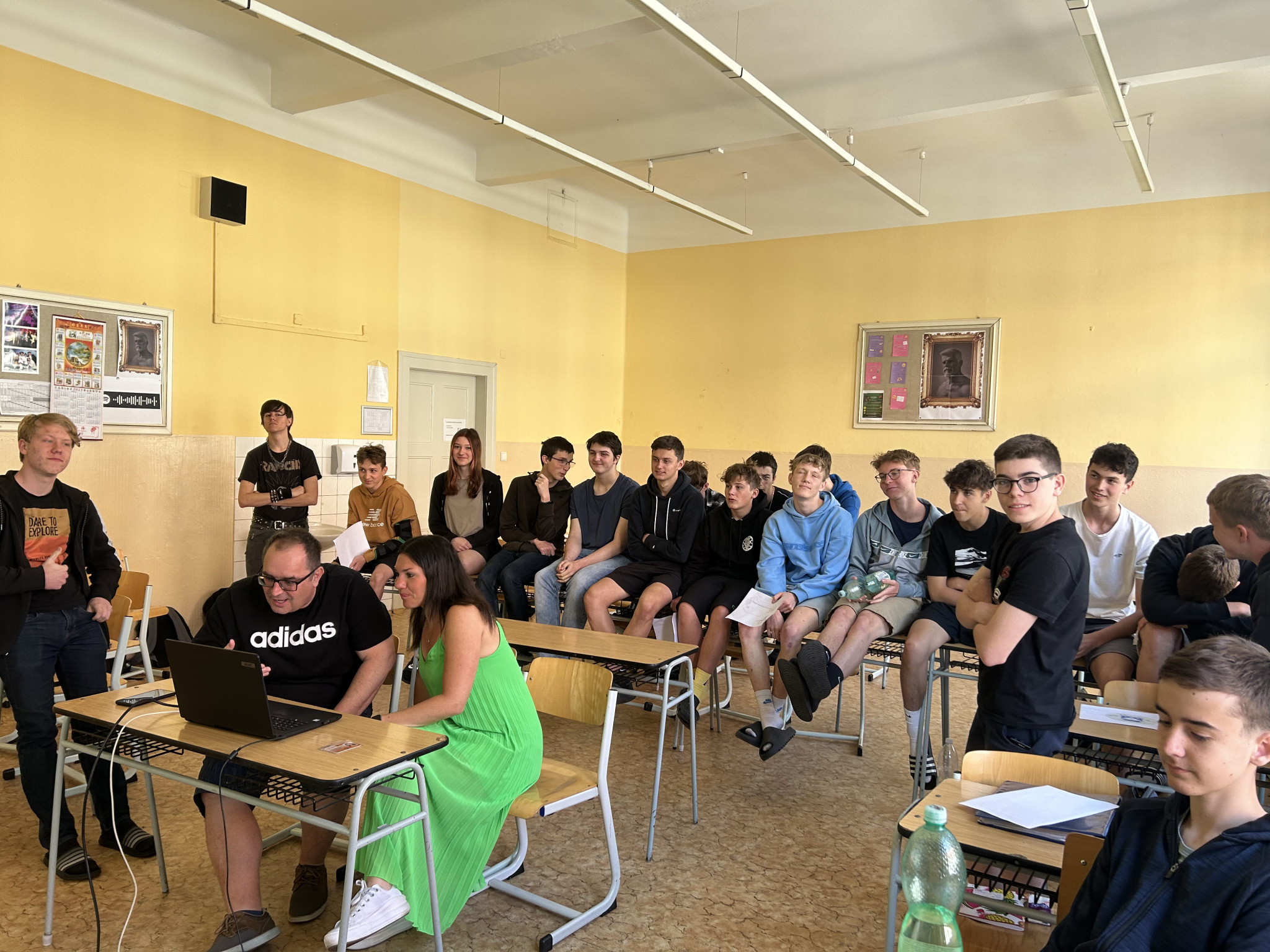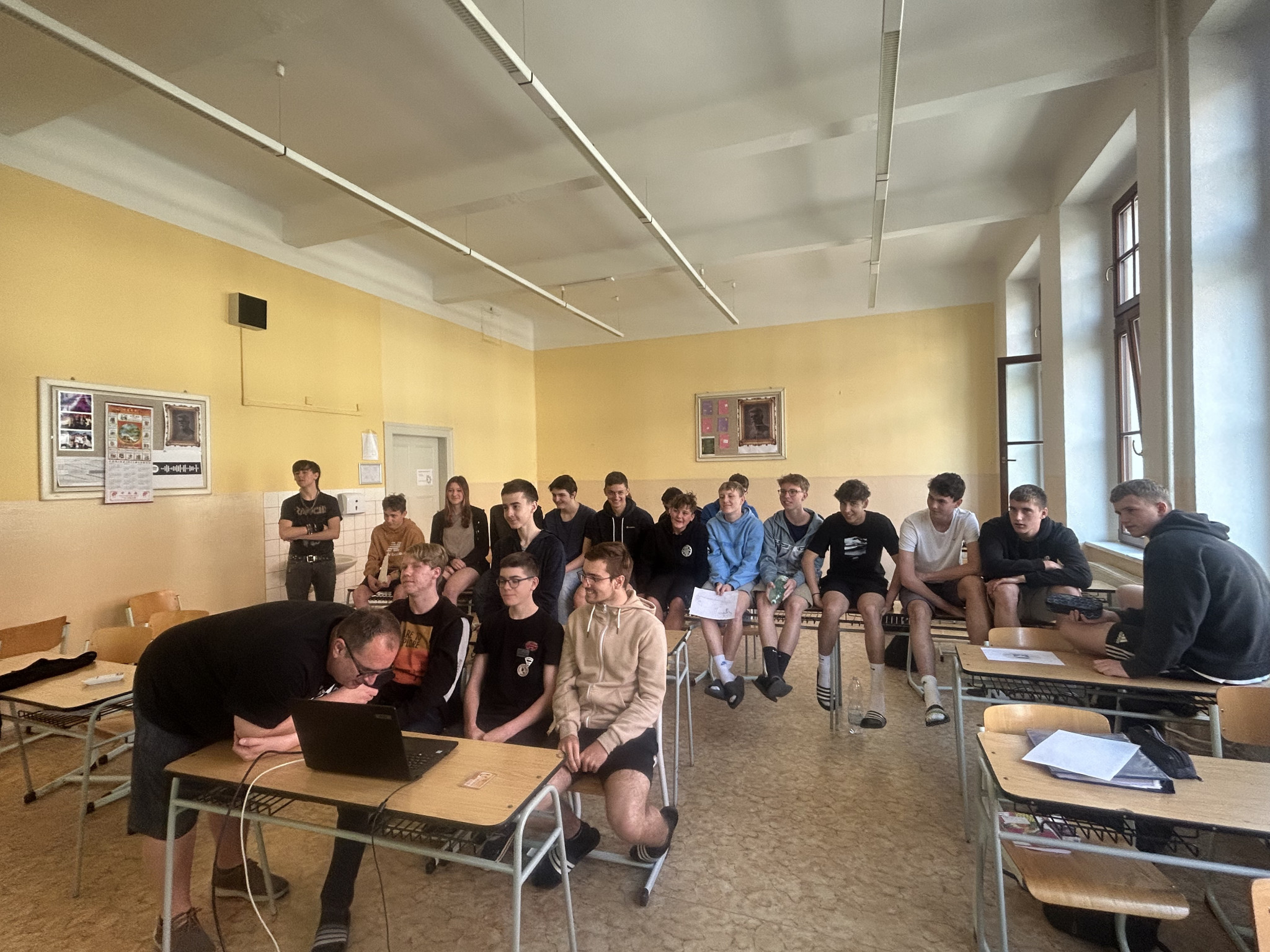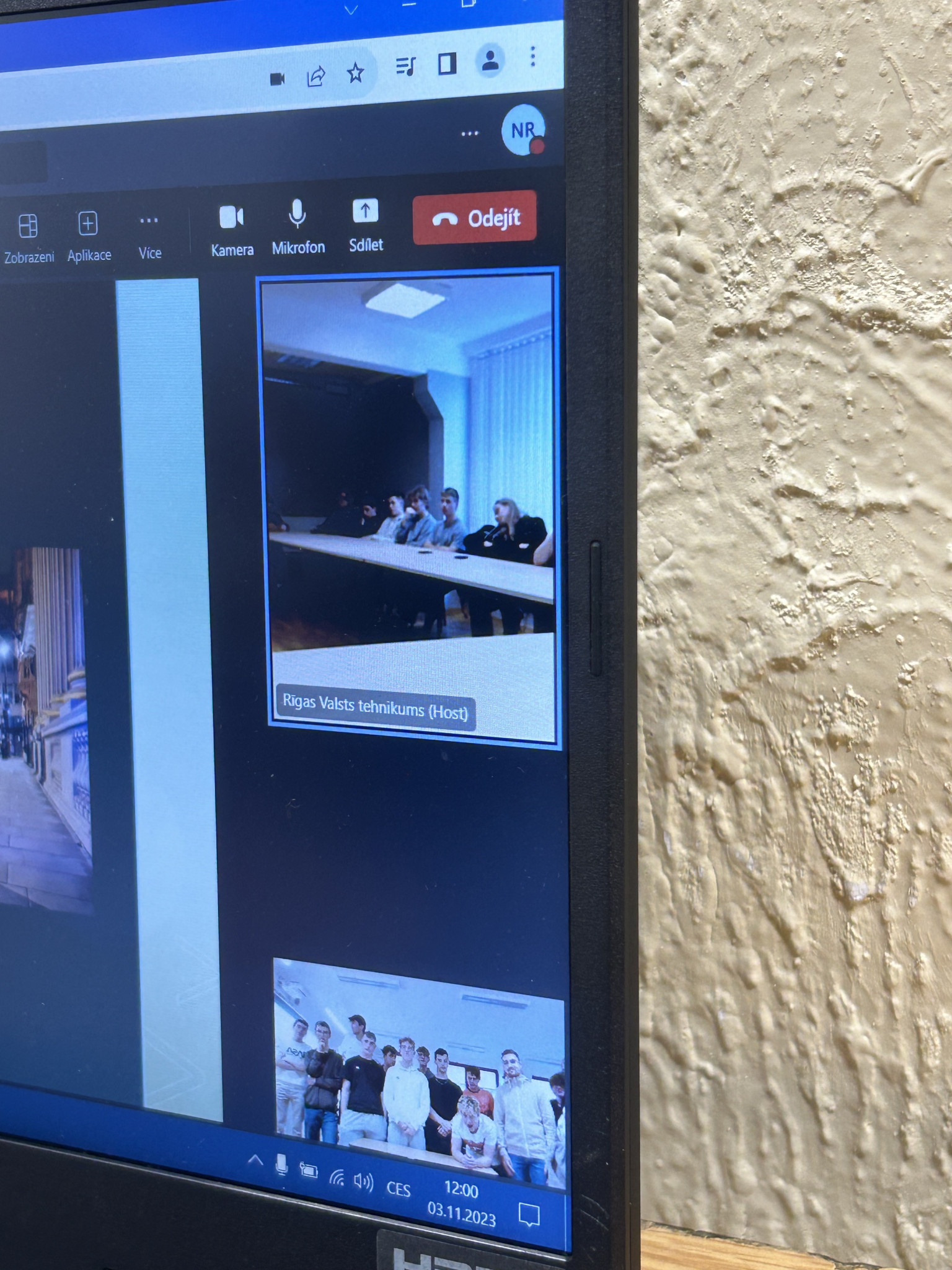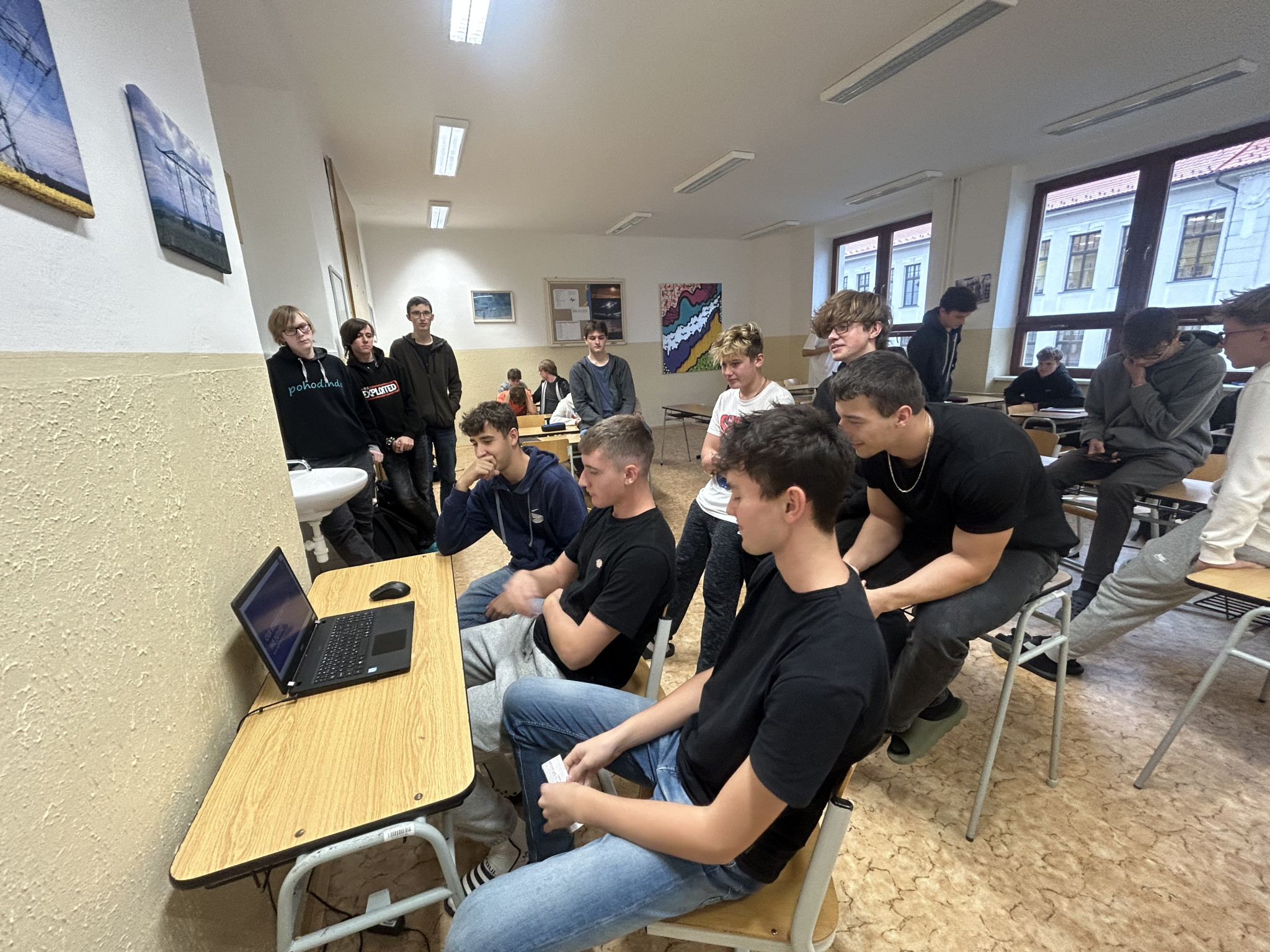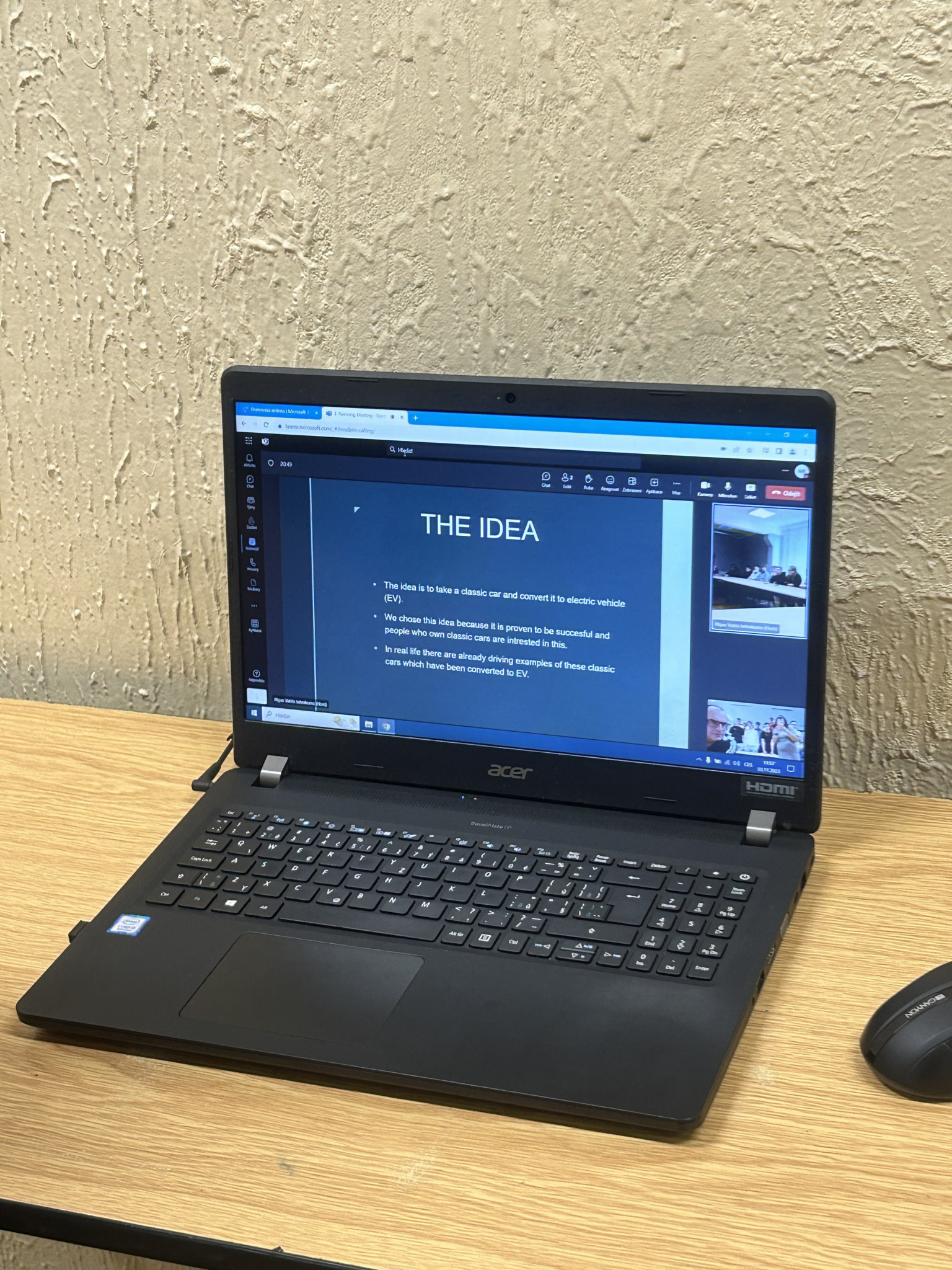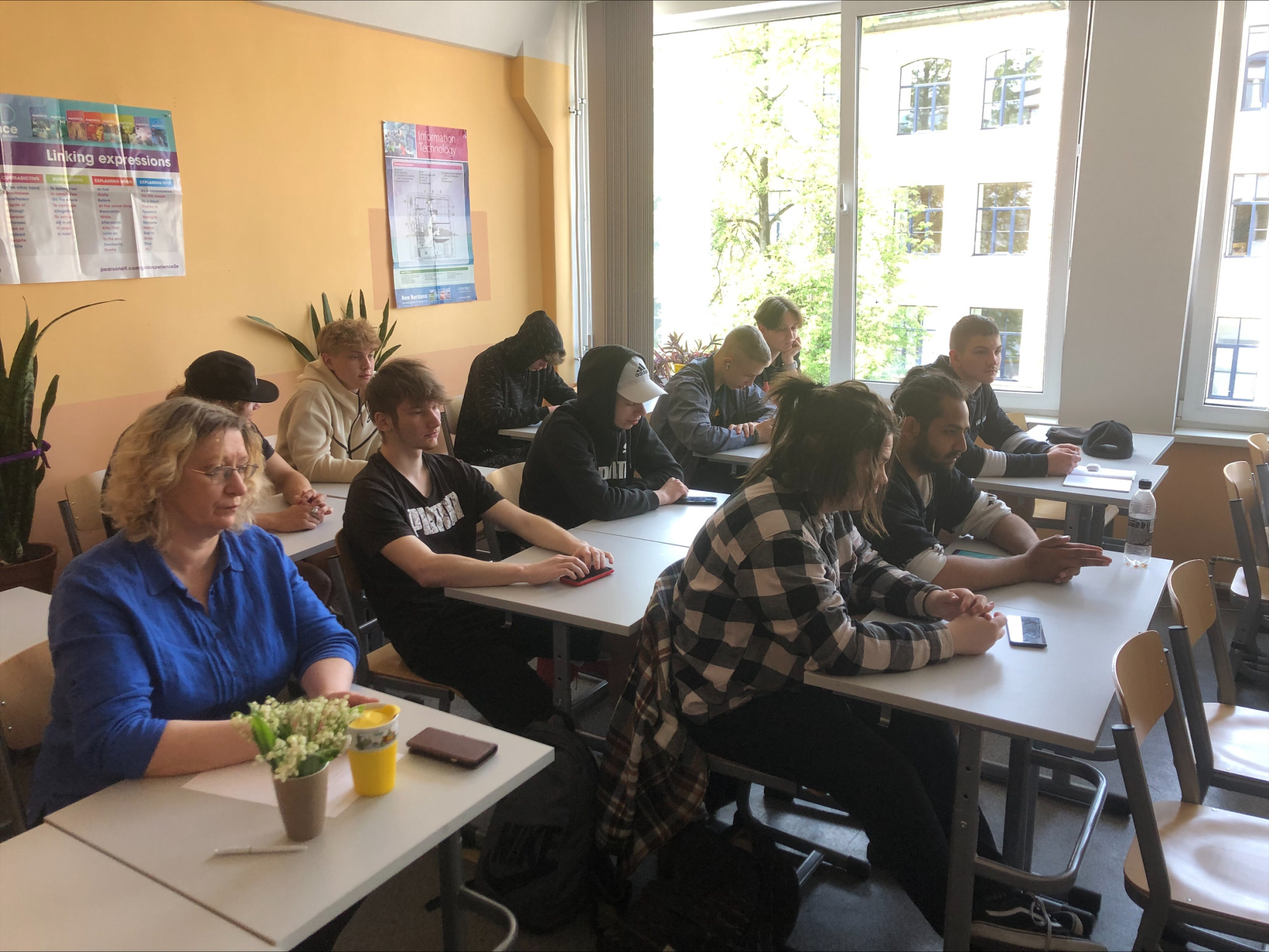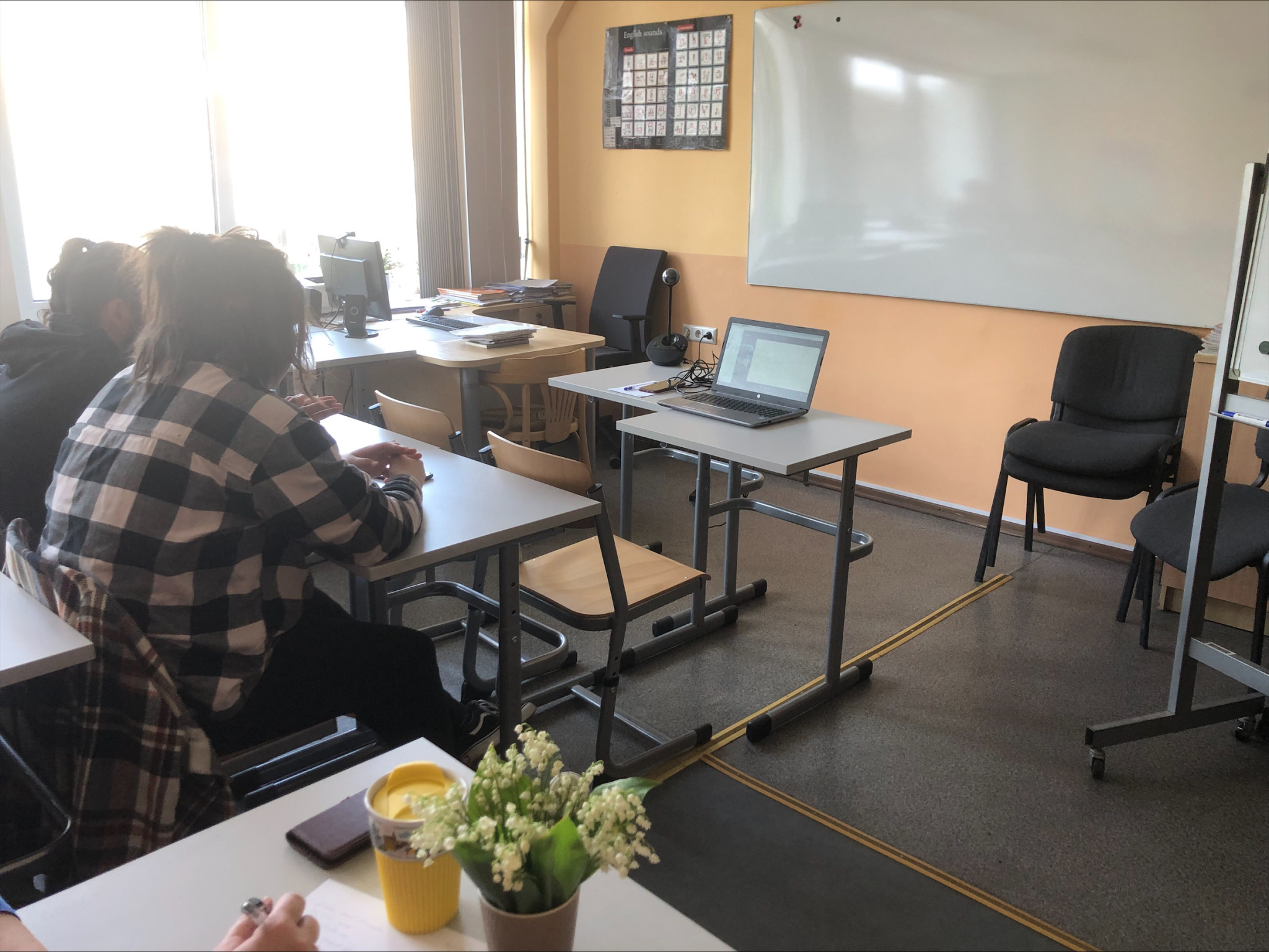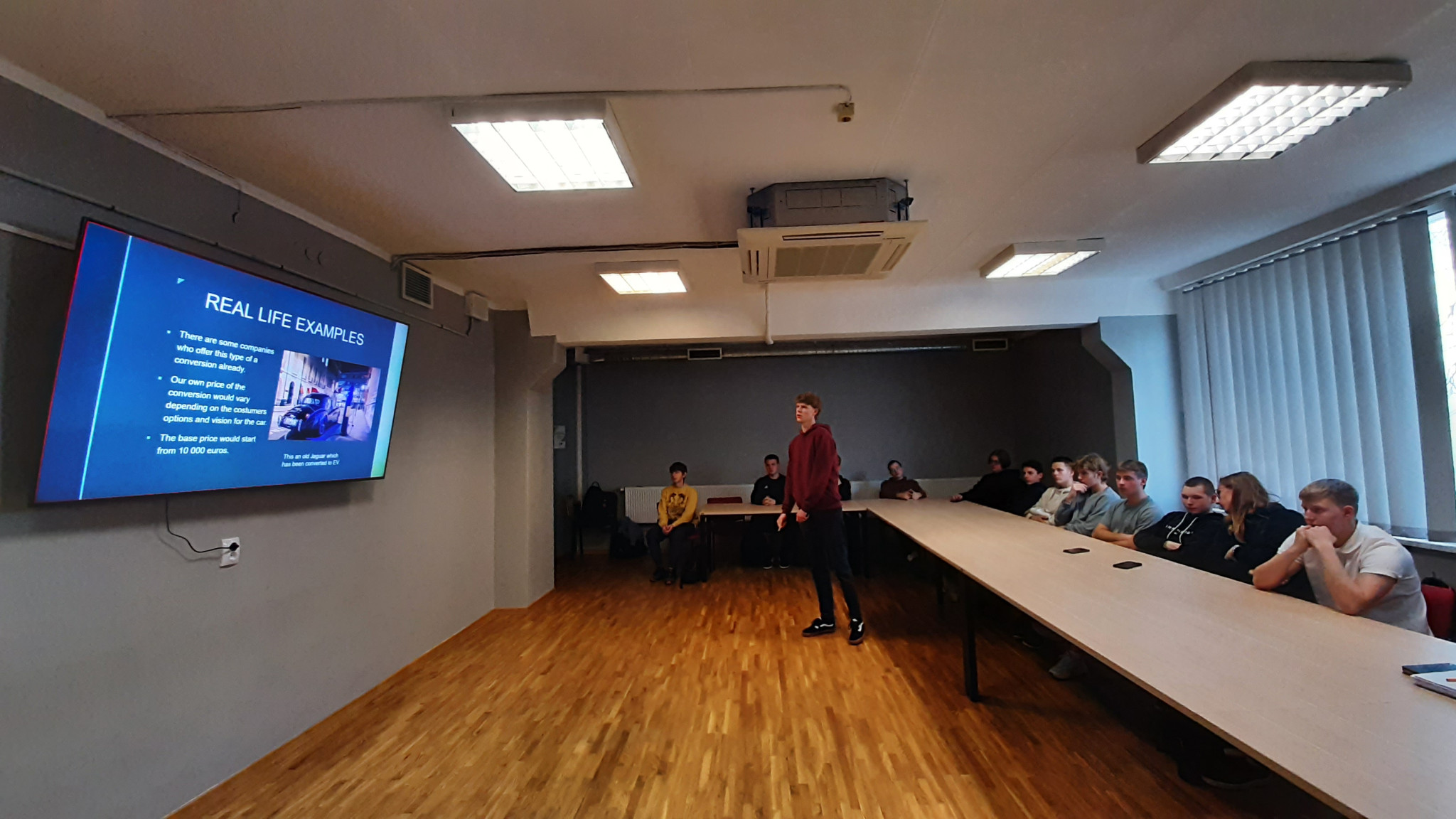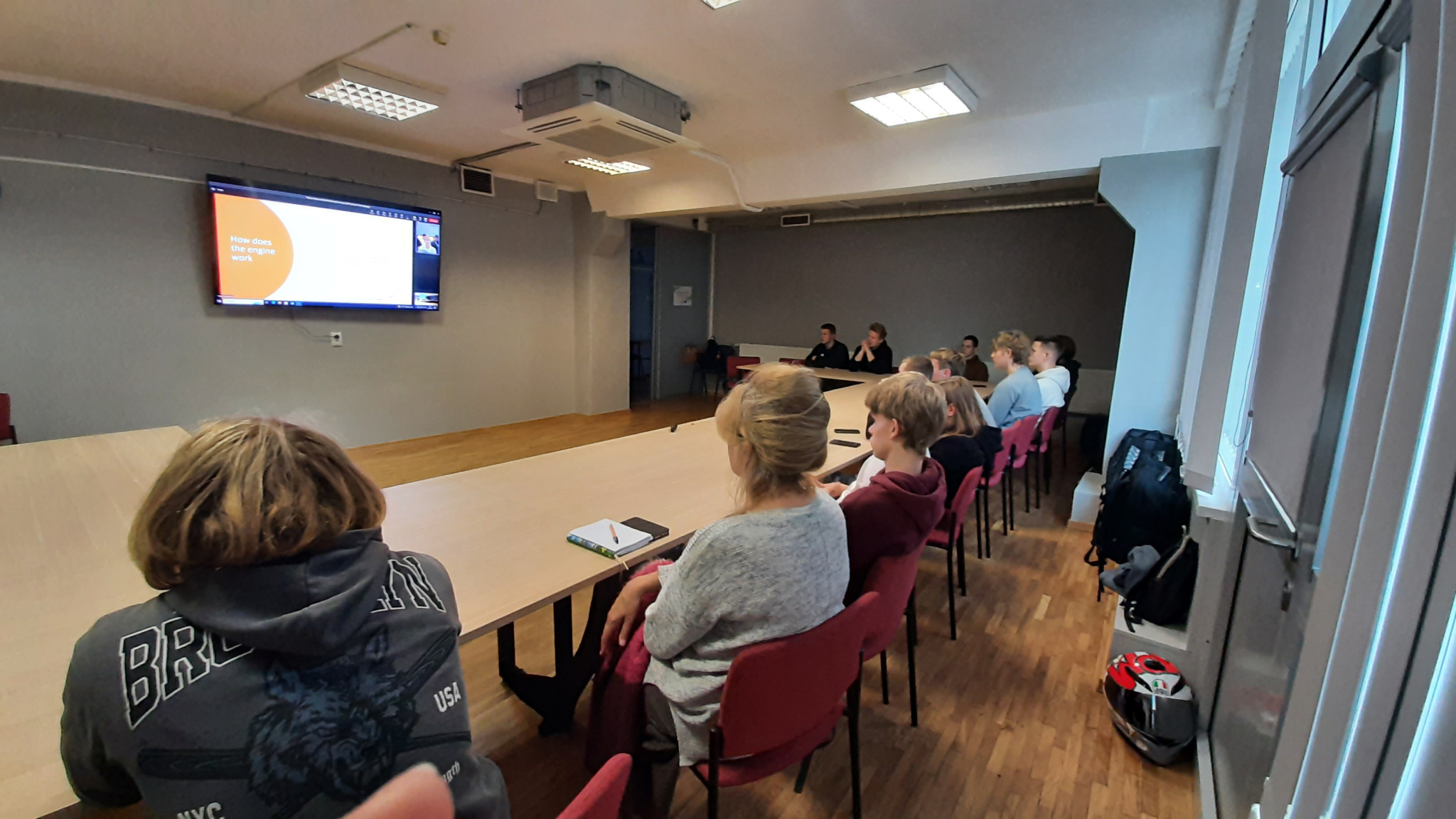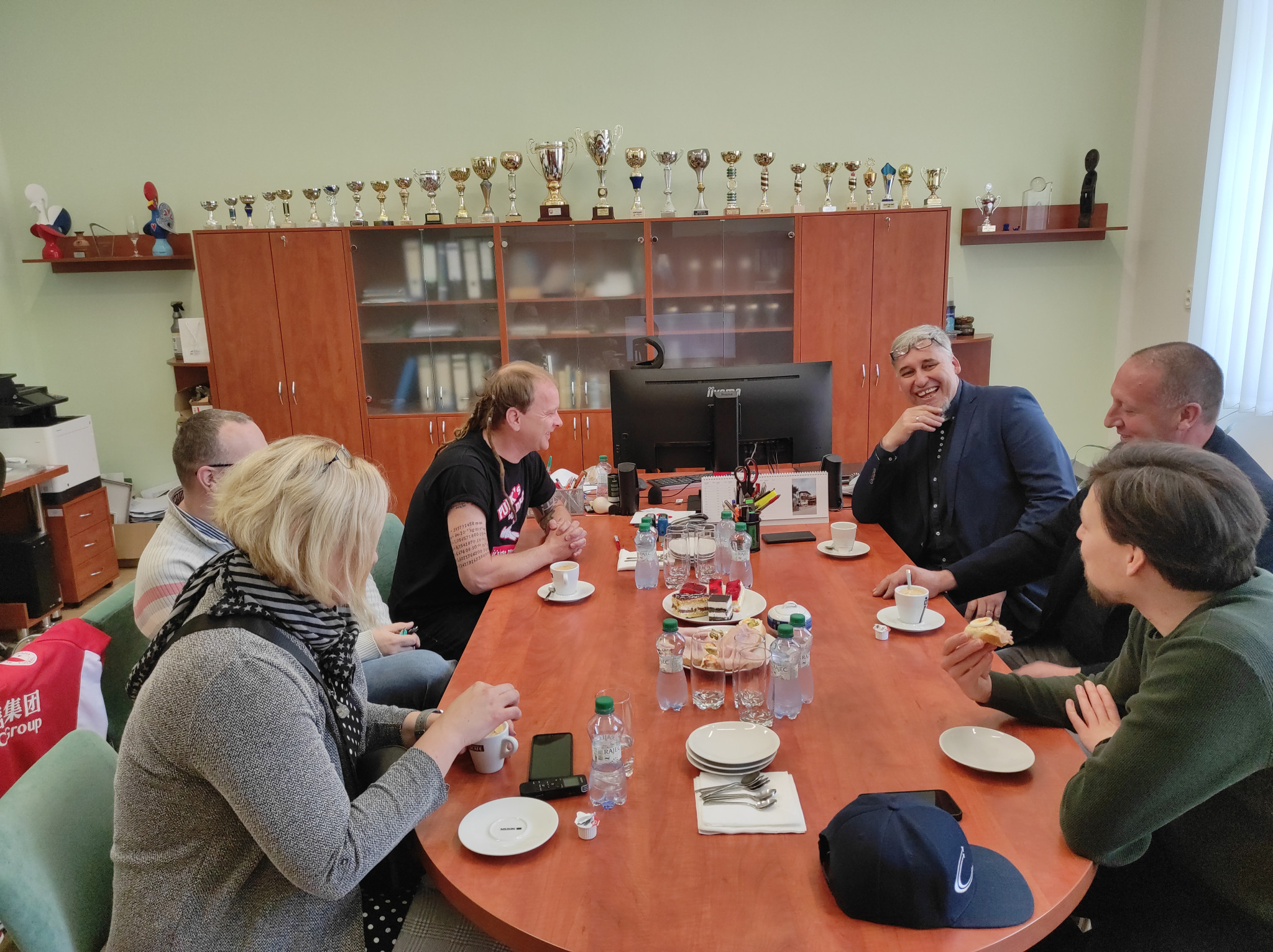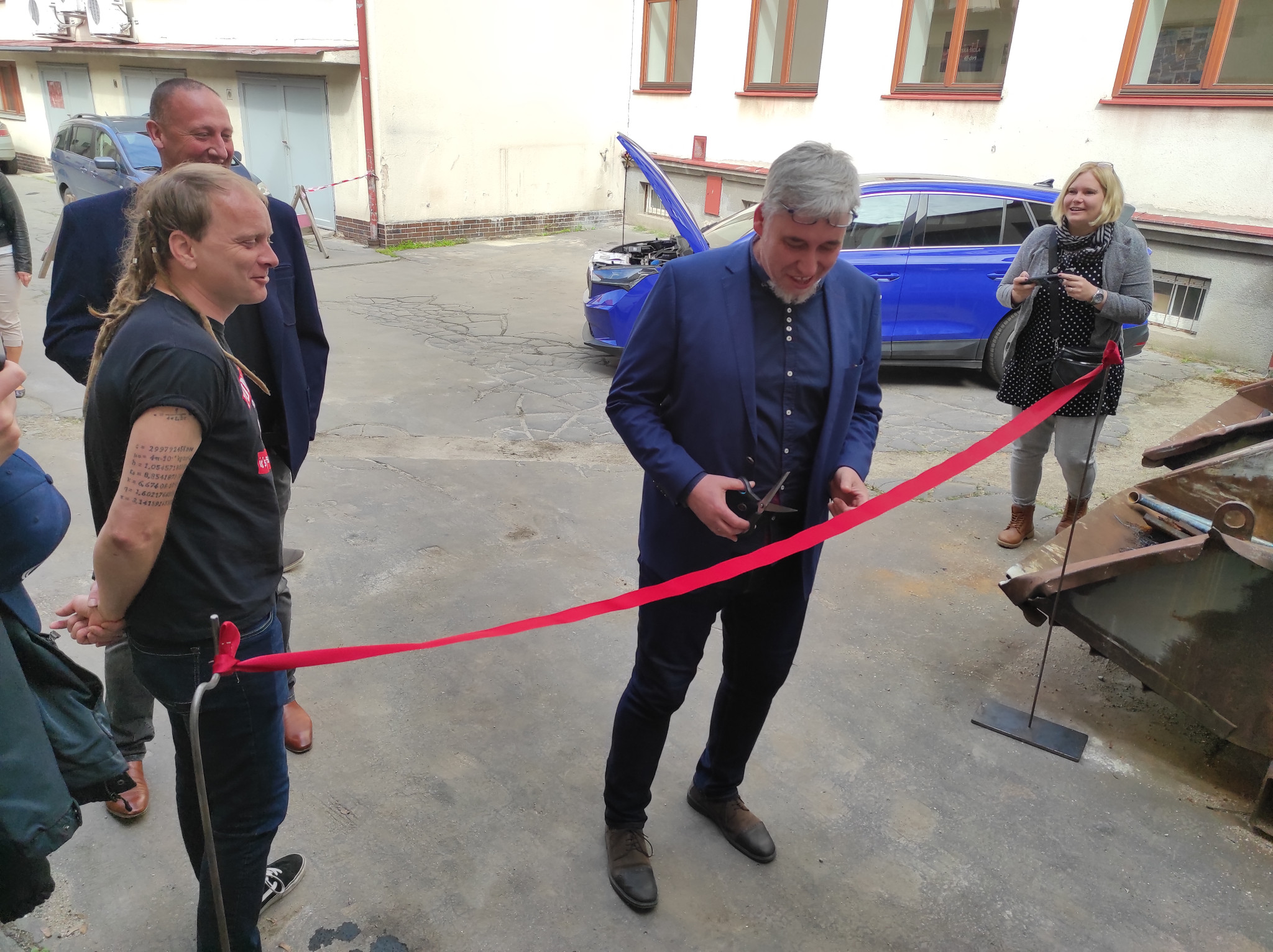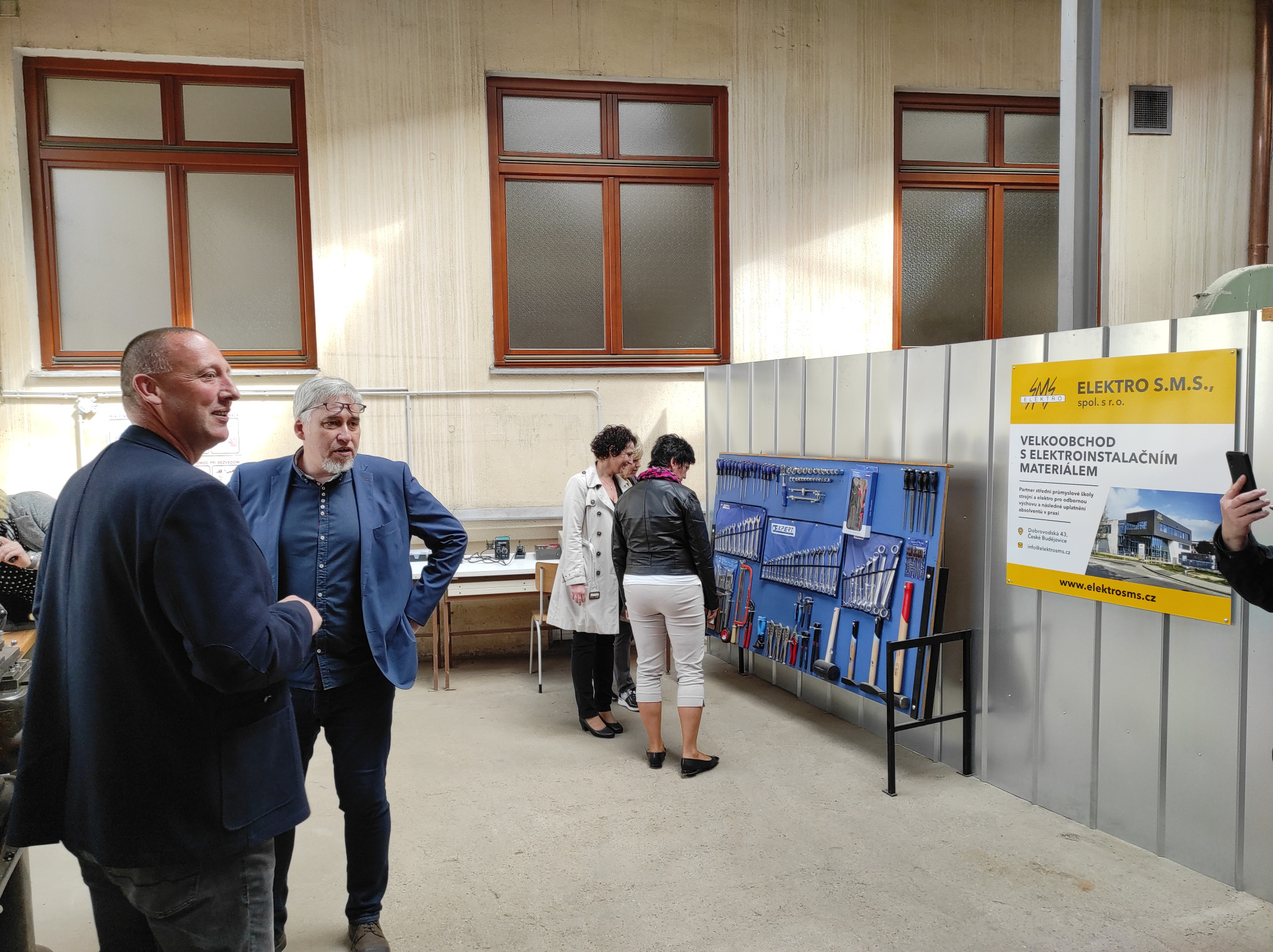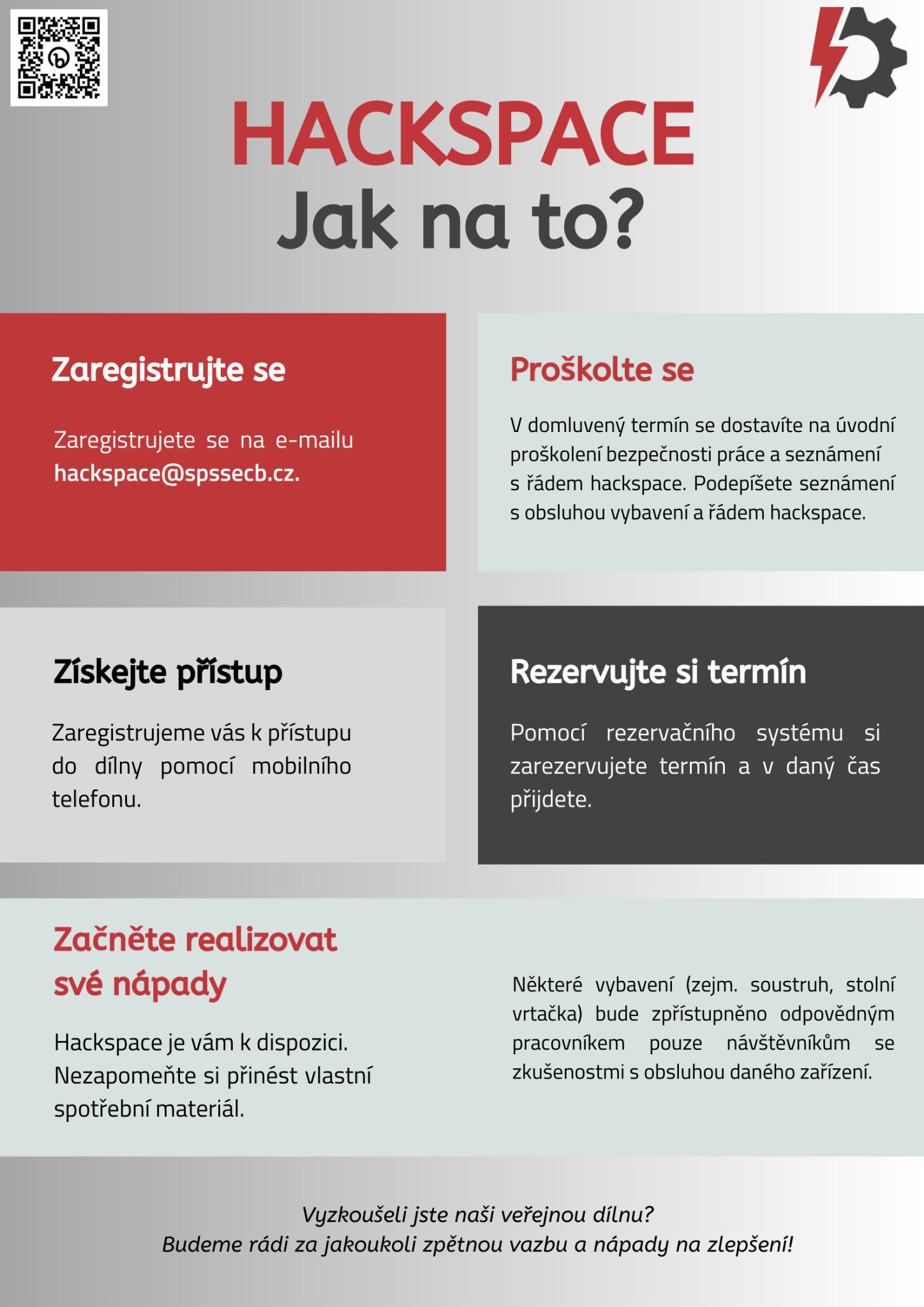KA1 Mobility Akreditace

WP1.1 Kulaté stoly / Round tables
WP1.1.1 Kulatý stůl k elektromobilitě (8. 6. 2023)
Dne 8. 6. 2023 se u nás v rámci programu Erasmus+ (název projektu: 2022-1-CZ01-KA210-VET-000082444 Doprava budoucnosti, udržitelná doprava, elektromobilita, vzdělávání pro budoucnost) konala akce Kulatý stůl k elektromobilitě.
Dne 8. 6. 2023 se u nás v rámci programu Erasmus+ (název projektu: 2022-1-CZ01-KA210-VET-000082444 Doprava budoucnosti, udržitelná doprava, elektromobilita, vzdělávání pro budoucnost) konala akce Kulatý stůl k elektromobilitě.
Celá akce začala úvodním slovem našeho pana ředitele (Mgr. Jaroslava Koreše, Ph.D.) a dvou našich vyučujících (Ing. Stanislava Strnada a Ing. Petra Šimka) v posluchárně školy. Žáci všech prvních ročníků (1.S, 1.EE, 1.EM a 1.ER) si tak mohli vyslechnout základní informace o oboru elektromobilita a alternativní pohony, jenž je propojením oboru strojírenství a elektrotechnika. Poté následovaly přednášky zástupců firem. Přednášejícími byli pánové Václav Vidl za Škoda Auto, a. s., Martin Klíma za E.ON Česká republika, s. r. o., Tomáš Chmelík za ČEZ, a. s., a František Pánek z firmy Robert Bosch, spol. s r. o., kteří mluvili o budoucnosti elektromobility.
Následně se žáci oboru elektromobilita a alternativní pohony (1.EM) a zástupci firem přesunuli do sborovny, kde žáci prezentovali výsledky svých dlouhodobých projektů. (Žáci byli rozděleni do čtyř skupin. Na konci března dostali všichni jednotné zadání – úkolem bylo vymyslet a vyrobit elektrické vozítko, přičemž museli splnit průměrnou zadanou rychlost na stanovené dráze, přesnost zastavení ve stanovené vzdálenosti, dodržet trajektorii a druh pohonu. Žáci projekt řešili samostatně s využitím poznatků získaných v odborně zaměřených předmětech. V průběhu práce měli možnost konzultovat případné problémy s vyučujícími. Vlastní realizaci řešili jednak sami ve volném čase, jednak v rámci dílen a hodin cvičení z odborných předmětů.) Žáci vedli celou prezentaci v angličtině a odpovídali na doplňující dotazy zástupců firem.
V odpoledních hodinách proběhlo ještě setkání zástupců firem a vedení školy, na kterém byly probrány možnosti dalšího uplatnění a stáží našich studentů ve firmách. Rovněž se prodiskutovala očekávání firem na obsahové zaměření studijního oboru elektromobilita a alternativní pohony.
Naši žáci se celého projektu zhostili na výbornou a i zástupci jednotlivých firem chválili jejich výtvory a prezentaci v anglickém jazyce. Znalosti a dovednosti našich žáků ocenila i regionální televize, která Kulatý stůl k elektromobilitě navštívila a z akce odvysílala reportáž. Celá akce byla důkazem toho, že obor elektromobilita a alternativní pohony v sobě skrývá velký potenciál a je oborem budoucnosti.
WP1.1.1 Electromobility Roundtable (8 June 2023)
On 8 June 2023, the Round Table on Electromobility took place in the framework of the Erasmus+ programme (project name: 2022-1-CZ01-KA210-VET-000082444 Future Transport, Sustainable Transport, Electromobility, Education for the Future).
On 8 June 2023, we hosted a Round Table on Electromobility within the Erasmus+ programme (project name: 2022-1-CZ01-KA210-VET-000082444 Future Transport, Sustainable Transport, Electromobility, Education for the Future).
The event started with an introduction by our director (Mgr. Jaroslav Koreš, Ph.D.) and two of our teachers (Ing. Stanislav Strnad and Ing. Petr Šimek) in the school auditorium. Pupils of all the first years (1.S, 1.EE, 1.EM and 1.ER) were able to hear basic information about the field of electromobility and alternative drives, which is an interconnection of mechanical and electrical engineering. This was followed by presentations by company representatives. The speakers were Václav Vidl from Škoda Auto, a. s., Martin Klíma from E.ON Česká republika, s. r. o., Tomáš Chmelík from ČEZ, a. s., and František Pánek from Robert Bosch, spol. s r. o., who spoke about the future of electromobility.
Afterwards, the pupils of the electromobility and alternative drives (1.EM) and the representatives of the companies moved to the assembly room, where the pupils presented the results of their long-term projects. At the end of March, they were all given a single assignment – the task was to invent and produce an electric vehicle, and they had to meet an average specified speed on a specified track, stopping accuracy over a specified distance, and adhere to a trajectory and type of drive. The pupils solved the project independently using the knowledge acquired in the vocational subjects. In the course of the work they had the opportunity to consult any problems with the teachers. The students conducted the entire presentation in English and answered additional questions from the company representatives.
In the afternoon, a meeting between the representatives of the companies and the school management took place to discuss the possibilities of further employment and internships of our students in companies. They also discussed the expectations of companies on the content of the study field of electromobility and alternative drives.
Our students did an excellent job with the project and the representatives of the companies praised their creations and presentation in English. The knowledge and skills of our pupils were also appreciated by the regional television, which visited the Electromobility Round Table and broadcasted a report from the event.
The whole event was proof that the field of electromobility and alternative drives has great potential and is the field of the future.
WP1.1.2 “Kulatý stůl v Rize” – Elektrická vozidla a hybridní technologie (7.11.2023)
V rámci projektu strategického partnerství Erasmus+ KA2 “Doprava budoucnosti, udržitelná doprava, elektromobilita, vzdělávání pro budoucnost”, č. 2022-1-CZ01-KA210-VET-000082444 se 7. listopadu 2023 v Technologickém a inovačním centru Státní technické školy v Rize uskutečnil “Kulatý stůl” na téma elektromobilů a hybridních technologií. Přednášející Matīss Zemītis ze společnosti Moller Baltic Import, dovozce vozů Volkswagen v pobaltských zemích a vozů Audi v Lotyšsku a Litvě, hovořil o elektromobilech Volkswagen a Audi. Na programu byla tato hlavní témata: 1. Proč přejít z ICE? 2. RAW materiály – kde a jak se začíná? 3. Analýza životního cyklu – bod zlomu; 4. Kde potom skončí baterie? Dále informoval posluchače o snížení emisí CO2 v průběhu výroby a provozu elektromobilů apod. důležitých aspektech.
Člen představenstva Lotyšské asociace elektromobilů Mārtiņš Stirāns seznámil posluchače s vývojem elektromobilů v čase včetně počátků jejich vynálezu, vývoje nabíjecích zařízení pro elektromobily, PEV/infrastruktury – DC Off – Board nabíjení, možnosti výměny baterií, různé typy zástrček a zásuvek, moderní nabíjecí stanice. Přednášející Igor Lušov, který je zástupcem školicího střediska Toyota, hovořil o globální vizi společnosti “TOYOTA”, budoucnost mobility bude spojena s hybridními technologiemi a inovativními řešeními elektrifikace. Na udržitelné mobilitě se budou podílet různé elektrifikované technologie a paliva. Využití hybridních technologií jako způsobu snižování emisí CO2 a NOx. Vysvětlil hlavní rozdíly mezi vozidlem s ledovým pohonem & mild hybridem (ICE), hybridním elektromobilem (HEV), plug-in HEV (PHEV), bateriovým elektromobilem (BEV), elektromobilem s palivovými články (FCEV) a novou generací vysoce výkonných baterií (lepší výkon, menší a bezpečnější, rychlejší doba nabíjení). Informoval o systému hybridního pohonu TOYOTA Hybrid Synergy Drive System a jeho schopnosti zvolit pro každou situaci nejvhodnější provozní režim, od čistě elektrického pohonu (pro nejvyšší účinnost) až po pohon motor + motor + baterie (pro výkon).
Lektor RSTS Gints Spruncis hovořil o elektro vstupu užitkových vozidel do automobilového průmyslu a jeho největších výzvách. “Kulatého stolu” se zúčastnili studenti a učitelé automobilového oboru. Na závěr prezentací proběhla u “Kulatého stolu” diskuse o elektromobilech, hybridních technologiích a možnostech nabíjení (moderní nabíjecí stanice).
WP1.1.2 “Rounded table in Riga” – Electric Vehicles and Hybrid Technologies (7 November 2023)
In the scope of the Erasmus+ KA2 Strategic partnership project “Transport of the future, sustainable transport, electromobility, education for the future “, No. 2022-1-CZ01-KA210-VET-000082444 on 7-th November 2023 a “Rounded table” on electric cars and hybrid technologies was held at the Technology and Innovation Center of Riga State Technical School. The lecturer Matīss Zemītis from Moller Baltic Import, the importer of Volkswagen cars in the Baltic States and Audi cars in Latvia and Lithuania, talked about Volkswagen and Audi electric cars. There were the following main topics: 1. Why switch from ICE? 2. RAW materials – where and how does it start? 3. Life cycle analysis – breakeven point; 4. Where do batteries end up afterward? He also informed the audience about the reduced CO2 emissions throughout the production and operation of the electric cars etc. important aspects. Board member of the Latvian Electric Cars Association Mārtiņš Stirāns informed the audience about the development of electric cars over time including the beginnings of their invention, EV charging equipment evolution, PEV/Infrastructure – DC Off – Board charging, battery swapping possibilities, different plug and socket types, modern charging stations. The lecturer Igor Lušov who is a representative of the Toyota training center talked about global vision of the company “TOYOTA”, the future of mobility will be connected to hybrid technologies and innovative electrification solutions. Different electrified technologies and fuels will participate in sustainable mobility. The use of hybrid technologies as a way of CO2 and NOx reduction. He explained the main differences between Ice vehicle & Mild hybrid (ICE), Hybrid electric vehicle (HEV), Plug-in HEV (PHEV), Battery electric vehicle (BEV), fuel cell electric vehicle (FCEV) and new generation of high-performance batteries (better performance, smaller and safer, faster charging times). He informed about the TOYOTA Hybrid Synergy Drive System and it’s ability to choose the most suitable operating mode for every situation, ranging from entirely electric power (for top efficiency) to engine+ motor + battery power (for performance). RSTS teacher Gints Spruncis talked about the electro-entry of commercial vehicles into the auto industry and its biggest challenges. The “Rounded table” was attended by students and teachers of the automotive department. At the end of the presentations, there were discussions at the “Round Table” about electric cars, hybrid technologies, and charging options (modern charging stations).
Presentations
WP1.2 Legislativa / Legislation

Legislativa a koncepce Školního vzdělávacího programu (ŠVP) oboru Elektromobilita
Základním zákonem, který určuje pravidla pro vzdělávání je v České republice zákon 561/2004 Sb. – tzv. Školský zákon. Při přípravě nového zaměření Elektromobilita a alternativní pohony jsme museli splnit několik požadavků, které z něj vyplývají.
Prvním předpokladem pro otevření nového oboru je jeho zavedení do Rejstříku škol. Rejstřík škol je databáze škol a školských zařízení, která (mimo jiné) u každé školy obsahuje informace o nabídce oborů, kterou škola poskytuje a o jejich maximální kapacitě. Konkrétně jsou ve Školském zákoně rejstříku školy věnovány paragrafy 142-152.
Protože naši školu zřizuje Jihočeský kraj (jsme jeho příspěvkovou organizací), podává žádost o změnu v rejstříku krajský úřad. Smyslem tohoto postupu je zajistit odpovídající skladbu nabízených oborů v kraji s vhodnou kapacitou, která rámcově odpovídá demografii a požadavkům trhu práce. V našem případě byla změna v rejstříku škol jednodušší o to, že jsme nezapisovali nový obor ve smyslu Nařízení vlády č. 211/2010 Sb. V tomto nařízení jsou určeny konkrétní obory, včetně jejich kódového značení. Škola poskytovala vzdělávání v oborech 23-41-M/01 Strojírenství a 26-41-M/01 Elektrotechnika, přičemž kapacita obou oborů byla 240 žáků (2 třídy v ročníku po max. 30 žácích). Změna v rejstříku škol, kterou jsme navrhovali obsahovala snížení kapacity oboru Strojírenství na 120 žáků a Elektrotechnika na 360 žáků. Jedna třída v oboru Elektrotechnika by byla vyčleněna na zaměření Elektromobilita a alternativní pohony.
Požadované změny byly se zřizovatelem (zejména s odborem školství) neformálně diskutovány od roku 2020, přičemž navrhovaná koncepce byla přijata pozitivně.
Protože v oborové soustavě ČR není přímo obor elektromobilita a ani není odpovídající Rámcový vzdělávací program a škola má v Rejstříku škol zapsán obor Elektrotechnika, rozhodli jsme se nové zaměření tohoto oboru založit na Rámcovém vzdělávacím programu pro obor Elektrotechnika. Rámcové vzdělávací programy jsou základními kurikulárními dokumenty, odkazované ve Školském zákoně (paragrafy 3 a 4). Z Rámcových vzdělávacích programů si pak škola sestavuje vlastní Školní vzdělávací program (paragraf 5 školského zákona).
Školní vzdělávací program (Elektromobilita a alternativní pohony) vychází z rámcového vzdělávacího programu pro obor vzdělávání Elektrotechnika. Vzdělávání podle uvedeného školního vzdělávacího programu (ŠVP) je na jedné straně široce koncipované tak, aby měl absolvent co nejširší uplatnění, na druhé straně nabízí určitou profilaci v oblastech, které jsou v regionu působnosti školy nejčastěji žádané na trhu práce. Zároveň je ale učivo vhodným způsobem doplněno i obor vzdělávání Strojírenství. Strategie vzdělávání je koncipována tak, aby absolvent disponoval potřebnou sumou všeobecných i odborných znalostí, dovednostmi řešit konkrétní úkoly a problémy v pracovním i osobním životě a měl odpovídající hodnotové postoje. Výuka má proto velký podíl praktického vyučování ve školních laboratořích, ve školních dílnách a praxe ve firmách. Důraz je kladen na osvojení anglického jazyka, enviromentální vzdělávání a získání dovedností práce s počítačem, automatizačními systémy a projektovou činností.
Blok strojírenství v oblasti dopravních prostředků je vyučován v prvním ročníku s dotací pět hodin týdně, ve druhém ročníku s dotací devět hodin týdně, ve třetím ročníku s dotací 5 hodin a ve čtvrtém ročníku s dotací šesti hodin týdně. Učivo navazuje na poznatky a dovednosti, které žáci získali na základní škole v předmětu fyzika. Učivo je členěno do celků, které v dané posloupnosti představují obsahově a logicky uspořádaný systém. Uvedený blok rovněž přispívá k hlubšímu a komplexnějšímu pochopení problematiky ve strojírenství. V každém ročníku mají žáci dvě hodiny týdně formou cvičení, kde v menším počtu upevňují získané znalosti, procvičují a opakují učivo, a mají možnost individuální konzultace s vyučujícím.
Blok elektrotechnika dopravních prostředků je vyučován v prvním a druhém ročníku s dotací pět hodin týdně, ve třetím ročníku s dotací devět hodin týdně a ve čtvrtém ročníku s dotací dvanáct hodin týdně. Učivo navazuje na poznatky a dovednosti, které žáci získali na základní škole v předmětu fyzika. Učivo je členěno do celků, které v dané posloupnosti představují obsahově a logicky uspořádaný systém. Uvedený blok rovněž přispívá k hlubšímu a komplexnějšímu pochopení potřebných fyzikálních zákonů. V prvním a druhém ročníku mají žáci dvě hodiny týdně formou cvičení, kde v menším počtu upevňují získané znalosti, procvičují a opakují učivo, a mají možnost individuální konzultace s vyučujícím.
Disponibilní hodiny byly využity především pro odborné zaměření oboru elektromobilita a vhodně rozděleny do bloku strojírenství a elektrotechnika.
Postavení nového zaměření na oboru Elektrotechnika korespondovalo i s naší prvotní představou o novém oboru – ten měl kombinovat obory Elektrotechnika a Strojírenství. Tuto kombinaci jsme po jednání s partnerskými firmami považovali za velmi perspektivní – vyřešila by problém v tom, že současně využívané technologie potřebují obsluhu a návrháře se znalostmi z obou oborů a v budoucnu bude jejich propojení ještě intenzivnější.
Při práci na ŠVP jsme průběžně komunikovali s firmami i vysokými školami a konzultovali náplň oboru.
Poté, co jsme měli ŠVP připravené jsme zaslali žádost zřizovateli o změnu v rejstříku škol. Součástí žádosti byl i Školní akční plán, což je strategický dokument, který popisuje plány školy na následující období. Následně proběhlo první jednání na odboru školství, jehož výstupem bylo sjednocení podkladů k žádosti o změnu v Rejstříku škol a také vyjasnění náplně oboru, určení dopadu otevření nového zaměření na ostatní školy a omezení požadavku na změnu počtu žáků v jednotlivých oborech. Oproti původně plánované změně 120 žáků oboru Strojírenství a 360 žáků oboru Elektrotechnika bylo odborem školství doporučeno, aby nebyla provedena změna pro všechny 4 ročníky najednou, ale každoročně dojde ke snížení kapacity oboru Strojírenství o 30 žáků a o tento počet naroste kapacita oboru Elektrotechnika. Zástupci zřizovatele ocenili, že se nezvyšuje celková kapacita školy a tím škola nebude odebírat uchazeče jiným technickým školám v kraji.
Po tomto jednání byla připravena žádost včetně povinných příloh, která byla projednána na Výboru pro výchovu, vzdělávání a zaměstnanost Zastupitelstva Jihočeského kraje. Členům výboru byla přednesena koncepce zaměření Elektromobilita a v následující diskuzi byly zodpovězeny dotazy zástupců výboru. Z důvodu velké konkurence mezi odbornými školami byla diskuze delší, ale nakonec Výbor doporučil Radě Jihočeského kraje tuto žádost o změnu v Rejstříku škol schválit.
Zpětně lze postup zavedení nového oboru jako časově náročnou záležitost, ale díky plnému využití disponibilních hodin RVP oboru Elektrotechnika nebylo nutné vzdělávací obsah řešit přes Ministerstvo školství, ale stačilo jen po dohodě se zřizovatelem změnit údaje v Rejstříku škol. I tak se jednalo o minimálně rok příprav, konzultací a jednání se zřizovatelem školy. Naší výhodou bylo i to, že v našem pojetí zaměření Elektromobilita kombinuje oba obory, které jsou na škole dlouhodobě vyučovány a na které má škola odpovídající technické vybavení a schopné učitele odborných předmětů.
Přílohy
- Koncepce ŠVP Elektromobilita
- Změna v rejstříku škol
- Koncepce rozvoje školy
Pro potřeby projektu budou do anglického jazyka přeloženy kromě úvodu – Legislativa a koncepce Školního vzdělávacího programu (ŠVP) oboru Elektromobilita i přílohy číslo 1 a 2.
Vypracovali v rámci projektu Erasmus 2022-1-CZ01-KA210-VET-000082444
Doprava budoucnosti, udržitelná doprava, elektromobilita, vzdělávání pro budoucnost:
Mgr. Jaroslav Koreš, Ph.D., ředitel školy; Mgr. Václav Chochol, zástupce ředitele
Legislation and the concept of the School Education Programme (SEP) in the field of Electromobility
The basic law that determines the rules for education in the Czech Republic is Act 561/2004 Coll. – the so-called School Act. When preparing the new focus on Electromobility and alternative drives, we had to meet several requirements arising from this law.
The first prerequisite for opening a new branch is its introduction into the Register of Schools. The Register of Schools is a database of schools and educational establishments which (among other things) contains information on the range of courses offered by each school and its maximum capacity. Specifically, sections 142-152 of the Education Act are devoted to the School Register.
Since our school is established by the South Bohemia Region (we are its contributory organization), the request for a change in the register is submitted by the regional office. The purpose of this procedure is to ensure an adequate composition of the fields of study offered in the region with a suitable capacity that corresponds to the demography and labour market requirements. In our case, the change in the school register was easier in that we did not register a new field of study in accordance with Government Regulation No. 211/2010 Coll. The school provided education in the fields of 23-41-M/01 Mechanical Engineering and 26-41-M/01 Electrical Engineering, with the capacity of both fields being 240 pupils (2 classes per year with a maximum of 30 pupils). The change in the school register that we proposed included a reduction in the capacity of the field of Mechanical Engineering to 120 pupils and Electrical Engineering to 360 pupils. One class in Electrical Engineering would be allocated to focus on Electromobility and Alternative Propulsion.
The requested changes have been discussed informally with the founder (in particular with the Education Department) since 2020, and the proposed concept has been positively received.
Since there is no electromobility field in the Czech Republic and no corresponding Framework Educational Programme and the school has the Electrical Engineering field in the Register of Schools, we decided to base the new focus of this field on the Framework Educational Programme for Electrical Engineering. The Framework Curricula are the basic curriculum documents referred to in the Education Act (Sections 3 and 4). From the Framework Curricula the school then draws up its own School Curriculum (Section 5 of the Education Act).
The school curriculum (Electromobility and alternative drives) is based on the Framework Curriculum for Electrical Engineering. The education according to this school curriculum is on the one hand broadly conceived so that the graduate has the widest possible application, on the other hand it offers a certain profiling in the areas that are most often in demand on the labour market in the region of the school’s operation. At the same time, however, the curriculum is suitably complemented by the field of study of Mechanical Engineering. The educational strategy is designed to ensure that the graduate has the necessary amount of general and professional knowledge, the skills to solve specific tasks and problems in professional and personal life, and the appropriate value attitudes. The teaching therefore has a large proportion of practical teaching in school laboratories, workshops and internships in companies. Emphasis is placed on the acquisition of the English language, environmental education and the acquisition of computer skills, automation systems and project work.
The block of mechanical engineering in the field of means of transport is taught in the first year with a subsidy of five hours per week, in the second year with a subsidy of nine hours per week, in the third year with a subsidy of five hours and in the fourth year with a subsidy of six hours per week. The curriculum builds on the knowledge and skills acquired in primary school in the subject of physics. The curriculum is divided into units which, in a given sequence, represent a system of content and logic. The unit also contributes to a deeper and more comprehensive understanding of the issues in engineering. In each year, pupils have two lessons per week in the form of exercises, where they consolidate the knowledge acquired in a smaller number, practise and repeat the material, and have the opportunity for individual consultation with the teacher.
The block of electrical engineering of means of transport is taught in the first and second year with five hours per week, in the third year with nine hours per week and in the fourth year with twelve hours per week. The curriculum builds on the knowledge and skills acquired in primary school in the subject of physics. The curriculum is divided into units which, in a given sequence, represent a system of content and logic. The unit also contributes to a deeper and more comprehensive understanding of the necessary laws of physics. In the first and second year, pupils have two lessons a week in the form of exercises, where they consolidate the knowledge acquired in smaller numbers, practise and repeat the material, and have the possibility of individual consultation with the teacher.
The available hours were used mainly for the professional focus of the field of electromobility and appropriately divided into the block of mechanical and electrical engineering.
The establishment of the new focus in Electrical Engineering corresponded with our initial idea of the new field – it was to combine the fields of Electrical Engineering and Mechanical Engineering. After discussions with partner companies, we considered this combination to be very promising – it would solve the problem that the technologies used at the same time need operators and designers with knowledge of both disciplines, and in the future their interconnection will be even more intense.
While working on the curriculum, we continuously communicated with companies and universities and consulted the content of the field.
After we had the SPP ready, we sent a request to the founder for a change in the school register. The application included a School Action Plan, which is a strategic document that describes the school’s plans for the coming period. Subsequently, an initial meeting was held at the Department of Education, which resulted in the consolidation of the documents for the application for a change in the School Register, as well as clarification of the subject area, determination of the impact of the opening of the new focus on other schools and limitation of the requirement for a change in the number of pupils in each subject area. Compared to the originally planned change of 120 pupils for Mechanical Engineering and 360 pupils for Electrical Engineering, it was recommended by the Education Department that the change should not be made for all 4 year groups at the same time, but that the capacity of Mechanical Engineering would be reduced by 30 pupils each year and the capacity of Electrical Engineering would increase by this number. The representatives of the founder appreciated that the overall capacity of the school is not increased and thus the school will not take applicants away from other technical schools in the region.
After this meeting, the application was prepared, including the mandatory annexes, and discussed at the Education, Training and Employment Committee of the South Bohemian Regional Assembly. The members of the Committee were presented with the concept of the Electromobility focus and in the following discussion questions of the representatives of the Committee were answered. Due to the high competition among vocational schools, the discussion was longer, but in the end the Committee recommended to the South Bohemian Regional Council to approve this request for a change in the Register of Schools.
In retrospect, the process of introducing a new field of study can be seen as a time-consuming affair, but thanks to the full use of available hours of the RVP in Electrical Engineering, it was not necessary to solve the educational content through the Ministry of Education, but it was enough to change the data in the Register of Schools in agreement with the founder. Even so, this involved at least a year of preparation, consultations and negotiations with the school’s founder. We also had the advantage that in our concept, the focus of Electromobility combines both disciplines that have been taught at the school for a long time and for which the school has adequate technical equipment and capable teachers of vocational subjects.
Attachments
- Concept of the ŠVP Electromobility
- Change in the school register
- Concept of school development
For the purposes of the project, in addition to the introduction – Legislation and Concept of the School Education Programme (SEP) for Electromobility, Annexes 1 and 2 will be translated into English.
Developed within the Erasmus 2022-1-CZ01-KA210-VET-000082444 project Future Transport, Sustainable Transport, Electromobility, Education for the Future: Mgr. Jaroslav Koreš, Ph.D., school director; Mgr. Václav Chochol, Deputy Director
Attachments:
Legislation and the educational system of the Republic of Latvia
The Latvian education system consists of pre-school education, basic education, secondary education, and higher education.
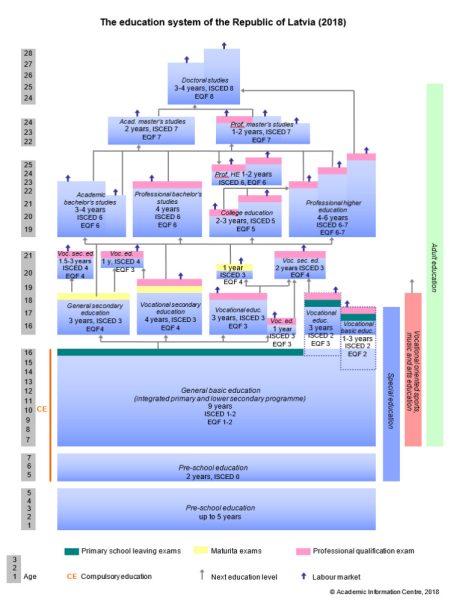
General education in Latvia in total lasts 12 years consisting of compulsory 9-years basic education and 3-years secondary education. Secondary education stage comprises general secondary education, vocational secondary education and vocational education.
Latvian Qualifications Framework (LQF). The Latvian Qualifications Framework is a system of eight levels encompassing all education levels (basic, secondary, and higher education) and all types of education (general, vocational, and academic), as well as professional qualifications acquired outside of formal education. LQF levels are described by the learning outcomes to be attained at each level.
Professional qualification levels (PQF). The professional qualification level is the theoretical and practical training corresponding to the framework structure of Latvian qualifications, which is characterized by the learning results that can be achieved at the relevant level, which gives the opportunity to perform work corresponding to a certain level of complexity and responsibility. PQF covers only professional education, which results in the award of a professional qualification. Professional qualification levels PQF are defined in the Law on Vocational Education.
European Professional Card. The European Professional Card is an electronic document equivalent to a decision on the recognition of professional qualifications. European citizens who have obtained professional qualifications in an EU country can apply for the European Professional Card, which is available for those wishing to establish permanent professional activity as well as those wishing to provide temporary services. These regulations provide a clear foundation for the organization and quality assurance of the professional education system in Latvia, designed to meet the demands of the modern labor market and ensure a high standard of education.
Objectives of Education Policy 2021 – 2027
Overarching goal of education development 2021-2027. is to provide quality educational opportunities for all Latvians to promote the development and realization of their potential throughout their lives and to develop their ability to change and responsibly manage constant changes in society and the economy.
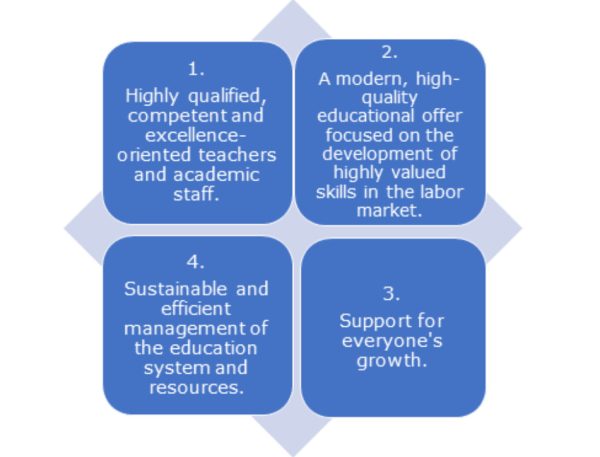
Ensuring that the offer of vocational education programs is in line with labor market trends is a priority. Many measures have been taken in the 2014-2020 programming period and the preconditions have been created to ensure such compliance. Since 2015, Sector Expert Councils (NEPs) have been formally operating (in accordance with the Law on Vocational Education) and are involved in the planning and implementation of vocational education. This applies both to the planning of the number of learners in accordance with the needs and development trends of the industry, and (at the level of delegated experts) by participating in the development of the content of vocational education programs, the development of examination content and the taking of qualification examinations. An important area of activity is the system of sectoral qualifications and the structure of sectoral qualifications, including evaluating the topicality of vocational education programs in relation to the qualifications required by the sectors, developing standards and advancing other industry issues.
To ensure the conformity of vocational education to the needs of the labour market collaboration among vocational education institutions and employers has been initiated and as a result, the possibilities for professional practice are guaranteed and common educational programs are developed.
In Latvia, professional education is regulated by several Cabinet of Ministers’ regulations and laws. These include standards for vocational education programs and qualifications that can be obtained outside formal education. The Ministry of Education and Science, along with the National Centre for Education and other bodies, develop and review these standards. There are some important laws and Cabinet of Ministers’ regulations:
- Law on Vocational Education (1999)
- Law on Education (Education act) (1998)
- Regulations No. 332 on the state vocational secondary education standard and the state vocational education standard (2020)
- Regulations No. 220 on admission procedures in professional education programs and deduction from them (2023)
- And others
According to the Cabinet of Ministers’ regulations, the Ministry of Education and Science and the National Centre for Education, in cooperation with the Tripartite Cooperation Sub-council of Vocational Education and Employment, organize the development and expert examination of draft professional standards and vocational standards, involving representatives from sectoral ministries and professional organizations. Professional education programs are developed by educational institutions in coordination with experts in industries.
Study programs at Riga State Technical School (RSTS). Currently, 22 vocational education programs are being implemented in RSTS and 33 different qualifications are possible to acquire in the following nine departments at RSTS: Auto, Computer, Business, Chemistry technology, Energetics, Mechanical engineering, Printing, Woodworking and Railway.
The good experiences in vocational automotive programs at Riga State Technical School focus on combining hands-on training with theoretical knowledge. Providing these programs demands up-to-date study equipment, the appropriate (necessary) number of spots and vehicles needed to be repaired in practical training, and partnerships with automotive companies. Our students gain practical experience in vehicle diagnostics, maintenance, and repair, supplemented by internships in the industry in Latvia as well as abroad.
Three qualifications are offered to study at Riga State Technical School: car mechanic, auto body repair, and vehicle Painter. Further, we will give more insight into the Auto mechanic study program and Auto body repair study program.
The auto body repair study program aims to prepare a body repair technician who performs vehicle, vehicle components, tractor bodies, cabins, vans, and wagons, as well as their components, replacement and repair, restoration and surface preparation for painting.
The car mechanic study program aims to prepare a car mechanic who can carry out car diagnostics, technical maintenance, and repair, disassembly, assembly, repair, and regulation of assemblies and aggregates, using technical documentation, complying with labor and environmental protection requirements, able to cooperate with the customer and supervise lower qualified employees.
The main tasks of the study program: As a result of the educational process, give opportunities to acquire the following knowledge, skills, and competencies:
- To plan and organize your work and workplace, observing the requirements of occupational safety, electrical safety, fire safety, and environmental protection.
- Provide safe working conditions for yourself and other employees by choosing appropriate work methods and aids.
- Use professional terminology in the national language and electronic databases in a foreign language (Note – first foreign language is English, second – Russian).
- Read blueprints, electrical and kinematic diagrams.
- Carry out technical maintenance and diagnostics of the car, its systems, and units.
- Determine the necessary repair works according to the manufacturer’s technology.
- Determine the cost of repairs and assess the economic validity of repairs.
- Repair and adjust car assemblies and aggregates using appropriate equipment, tools, and auxiliary devices.
- Check the quality of repair, the operation of car systems and mechanisms.
- Ensure appropriate use and maintenance of assigned tools, equipment and inventory in working order.
- Solve non-standard situations, and replace original parts with repair parts.
- Solve problem situations, cooperate with the client and provide information about services.
- Self-educating, constantly improving professional competence according to the level of development of the technology and equipment used.
- Communicate in the national language and in one foreign language.
- To comply with the regulatory acts regulating labor legal relations.
Advanced study programs in the automotive department might also encompass emerging technologies such as electric cars and hybrid vehicles, given their rapid integration into the market and our daily lives. Electric cars play a pivotal role, while hybrid vehicles, bridging the gap between traditional internal combustion engines and fully electric vehicles, are also instrumental in this electric revolution.
The experts from Riga State Technical School, professionals in the automotive industry, and members of the expert council are unanimous in their belief in the need to enhance the current car mechanic study program within the car department at RSTS. They propose the inclusion of specific modules covering the repair, disassembly, assembly, and technical maintenance of electric cars and hybrid vehicles.
Legislativa a vzdělávací systém Lotyšské republiky
Lotyšský vzdělávací systém se skládá z předškolního vzdělávání, základního vzdělávání, sekundárního vzdělávání a vysokoškolského vzdělávání.

Všeobecné vzdělávání v Lotyšsku trvá celkem 12 let a skládá se z povinného 9letého základního vzdělávání a 3letého sekundárního vzdělávání. Stupeň středního vzdělávání zahrnuje všeobecné střední vzdělávání, střední odborné vzdělávání a odborné vzdělávání.
Lotyšský kvalifikační rámec (LQF). Lotyšský kvalifikační rámec je systém osmi úrovní, který zahrnuje všechny úrovně vzdělávání (základní, střední a vysokoškolské) a všechny typy vzdělávání (všeobecné, odborné a akademické), jakož i odborné kvalifikace získané mimo formální vzdělávání. Úrovně LQF jsou popsány výsledky učení, kterých má být na každé úrovni dosaženo.
Úrovně profesní kvalifikace (PQF). Úroveň odborné kvalifikace je teoretická a praktická příprava odpovídající rámcové struktuře lotyšských kvalifikací, která se vyznačuje výsledky učení, kterých lze dosáhnout na příslušné úrovni, což dává příležitost vykonávat práci odpovídající určité úrovni složitosti a odpovědnost. PQF zahrnuje pouze odborné vzdělávání, jehož výsledkem je udělení odborné kvalifikace. Úrovně profesní kvalifikace PQF jsou definovány v zákoně o odborném vzdělávání.
Evropský profesní průkaz . Evropský profesní průkaz je elektronický dokument ekvivalentní rozhodnutí o uznání odborné kvalifikace. Evropští občané, kteří získali odbornou kvalifikaci v zemi EU, mohou požádat o evropský profesní průkaz, který je k dispozici pro ty, kteří si chtějí založit trvalou odbornou činnost, i pro ty, kteří chtějí poskytovat dočasné služby. Tyto předpisy poskytují jasný základ pro organizaci a zajištění kvality systému odborného vzdělávání v Lotyšsku, který je navržen tak, aby splňoval požadavky moderního trhu práce a zajistil vysoký standard vzdělávání.
Cíle vzdělávací politiky 2021 – 2027
Zastřešující cíl rozvoje vzdělávání 2021-2027. je poskytovat všem Lotyšům kvalitní vzdělávací příležitosti k podpoře rozvoje a realizace jejich potenciálu po celý život a k rozvoji jejich schopnosti měnit a zodpovědně řídit neustálé změny ve společnosti a ekonomice.

Prioritou je zajistit, aby nabídka programů odborného vzdělávání odpovídala trendům na trhu práce. V programovém období 2014-2020 byla přijata řada opatření a byly vytvořeny předpoklady pro zajištění tohoto plnění. Od roku 2015 formálně fungují (v souladu se zákonem o odborném vzdělávání) Sektorové odborné rady (NEP), které se podílejí na plánování a realizaci odborného vzdělávání. To se týká jak plánování počtu studujících v souladu s potřebami a vývojovými trendy oboru, tak (na úrovni delegovaných odborníků) participací na tvorbě obsahu programů odborného vzdělávání, tvorbě obsahu zkoušek a složení kvalifikačních zkoušek. Důležitou oblastí činnosti je systém odvětvových kvalifikací a struktura odvětvových kvalifikací, včetně hodnocení aktuálnosti programů odborného vzdělávání ve vztahu ke kvalifikaci požadovaných odvětvími, vytváření standardů a prosazování dalších oborových problémů.
Pro zajištění souladu odborného vzdělávání s potřebami trhu práce byla zahájena spolupráce mezi odbornými vzdělávacími institucemi a zaměstnavateli, v důsledku čehož jsou garantovány možnosti odborné praxe a rozvíjeny společné vzdělávací programy.
V Lotyšsku je profesní vzdělávání regulováno několika nařízeními a zákony kabinetu ministrů. Patří mezi ně standardy pro programy odborného vzdělávání a kvalifikace, které lze získat mimo formální vzdělávání. Ministerstvo školství a vědy spolu s Národním střediskem pro vzdělávání a dalšími orgány tyto standardy vytváří a reviduje. Existuje několik důležitých zákonů a nařízení kabinetu ministrů:
- Zákon o odborném vzdělávání (1999)
- Zákon o vzdělávání (školský zákon) (1998)
- Vyhláška č. 332 o státním standardu středního odborného vzdělávání a státním standardu odborného vzdělávání (2020)
- Předpis č. 220 o přijímacím řízení v programech odborného vzdělávání a srážkách z nich (2023)
- A další
Ministerstvo školství a vědy a Národní centrum pro vzdělávání ve spolupráci s Podradou tripartitní spolupráce pro odborné vzdělávání a zaměstnanost organizují podle nařízení kabinetu vypracování a odborné posouzení návrhů profesních standardů a odborných standardů. , za účasti zástupců resortních ministerstev a profesních organizací. Programy odborného vzdělávání vyvíjejí vzdělávací instituce v koordinaci s odborníky v průmyslu.
Studijní programy v Rize Stát Technická škola ( RSTS) . V současné době je v RSTS realizováno 22 programů odborného vzdělávání a 33 různých kvalifikací je možné získat v následujících devíti oborech RSTS: Auto, Počítač, Obchod, Chemická technologie, Energetika, Strojírenství, Polygrafie, Dřevoobrábění a Železnice.
Dobré zkušenosti s odbornými automobilovými programy v Rize Stát Technická škola se zaměřuje na kombinaci praktické výuky s teoretickými znalostmi. Poskytování těchto programů vyžaduje moderní studijní vybavení, odpovídající (nezbytný) počet míst a vozidel, které je třeba opravit při praktickém výcviku, a partnerství s automobilovými společnostmi. Naši studenti získávají praktické zkušenosti v oblasti diagnostiky, údržby a oprav vozidel, doplněné stážemi v průmyslu v Lotyšsku i v zahraničí.
Ke studiu na státní technické škole v Rize jsou nabízeny tři kvalifikace: automechanik, opravář karoserií a lakýrník vozidel. Dále přiblížíme studijní program Automechanik a Studijní program opravy karoserií.
Studijní program opravy karoserií si klade za cíl připravit technika oprav karoserií, který provádí vozidla, díly vozidel, karoserie traktorů, kabiny, dodávky a vagóny, jakož i jejich součásti, výměny a opravy, restaurování a přípravu povrchu pro lakování.
Hlavní úkoly studijního programu: V důsledku vzdělávacího procesu dávat příležitost k získání následujících znalostí, dovedností a kompetencí:
- Plánovat a organizovat svou práci a pracoviště při dodržení požadavků bezpečnosti práce, elektrické bezpečnosti, požární bezpečnosti a ochrany životního prostředí.
- Zajistit bezpečné pracovní podmínky sobě i ostatním zaměstnancům výběrem vhodných pracovních metod a pomůcek.
- Používat odbornou terminologii v národním jazyce a elektronické databáze v cizím jazyce (pozn. – první cizí jazyk je angličtina, druhý – ruština).
4. Přečtěte si plány, elektrická a kinematická schémata. - Defektovat karoserie vozidel a určit potřebné opravné práce podle technologie výrobce.
- Stanovit náklady na opravy karoserie vozidla a posoudit ekonomickou opodstatněnost oprav.
- Demontujte a smontujte samostatné dokončovací díly karoserie, proveďte antikorozní úpravu.
- Vyměňte díly karoserie vozidla technikou svařování, nýtování a lepení podle technologie výrobce.
- Obnovte geometrické rozměry karoserie vozidla pomocí stojanu na opravy karoserií a technických databází.
- Obnovit tvary povrchů dílů karoserie vozidel, rovnací nářadí, technologie tmelení a pocínování.
- Kontrolovat kvalitu práce měřením a vizuálním hodnocením karoserií vozidel.
- Zajistit vhodné používání a údržbu přidělených nástrojů, zařízení a inventáře v provozuschopném stavu.
- Řešit problémové situace, spolupracovat s klientem a poskytovat informace o službách.
- Sebevzdělávání, neustále se zlepšující odborná způsobilost podle úrovně rozvoje používané techniky a zařízení.
- Dodržovat regulační akty upravující pracovně právní vztahy.
Studijní program automechanik si klade za cíl připravit automechanika, který umí provádět diagnostiku automobilů, technickou údržbu a opravy, demontáž, montáž, opravy a seřizování sestav a agregátů s využitím technické dokumentace, splňující požadavky na ochranu práce a životního prostředí, schopného spolupracovat se zákazníkem a dohlížet na méně kvalifikované zaměstnance.
Hlavní úkoly studijního programu : V důsledku vzdělávacího procesu dávat příležitost k získání následujících znalostí, dovedností a kompetencí:
- Plánovat a organizovat svou práci a pracoviště při dodržení požadavků bezpečnosti práce, elektrické bezpečnosti, požární bezpečnosti a ochrany životního prostředí.
- Zajistit bezpečné pracovní podmínky sobě i ostatním zaměstnancům výběrem vhodných pracovních metod a pomůcek.
- Používat odbornou terminologii v národním jazyce a elektronické databáze v cizím jazyce (pozn. – první cizí jazyk je angličtina, druhý – ruština).
- Přečtěte si plány, elektrická a kinematická schémata.
- Provádět technickou údržbu a diagnostiku vozu, jeho systémů a celků.
- Určete potřebné opravy podle technologie výrobce.
- Stanovit náklady na opravy a posoudit ekonomickou opodstatněnost oprav.
- Opravy a seřízení automobilových sestav a agregátů pomocí vhodného vybavení, nářadí a pomocných zařízení.
- Zkontrolujte kvalitu opravy, fungování systémů a mechanismů automobilu.
- Zajistit vhodné používání a údržbu přidělených nástrojů, zařízení a inventáře v provozuschopném stavu.
- Řešte nestandardní situace a nahraďte originální díly náhradními díly.
- Řešit problémové situace, spolupracovat s klientem a poskytovat informace o službách.
- Sebevzdělávání, neustále se zlepšující odborná způsobilost podle úrovně rozvoje používané techniky a zařízení.
- Komunikovat v národním jazyce a v jednom cizím jazyce.
- Dodržovat regulační akty upravující pracovně právní vztahy.
Pokročilé studijní programy na katedře automobilového průmyslu mohou také zahrnovat vznikající technologie, jako jsou elektrická auta a hybridní vozidla, vzhledem k jejich rychlé integraci na trh a do našeho každodenního života. Elektromobily hrají stěžejní roli, zatímco hybridní vozidla, která překlenují propast mezi tradičními spalovacími motory a plně elektrickými vozidly, jsou rovněž nástrojem této elektrické revoluce.
Odborníci ze Státní technické školy v Rize, profesionálové v automobilovém průmyslu a členové odborné rady jsou jednotní ve svém přesvědčení o potřebě zkvalitnit současný studijní program automechanik v rámci oboru auto na RSTS. Navrhují zahrnutí specifických modulů pokrývajících opravy, demontáž, montáž a technickou údržbu elektromobilů a hybridních vozidel.
Legislation and the educational system of the Republic of Latvia

General education in Latvia in total lasts 12 years consisting of compulsory 9-years basic education and 3-years secondary education. Secondary education stage comprises general secondary education, vocational secondary education and vocational education.
Latvian Qualifications Framework (LQF). The Latvian Qualifications Framework is a system of eight levels encompassing all education levels (basic, secondary, and higher education) and all types of education (general, vocational, and academic), as well as professional qualifications acquired outside of formal education. LQF levels are described by the learning outcomes to be attained at each level.
Professional qualification levels (PQF). The professional qualification level is the theoretical and practical training corresponding to the framework structure of Latvian qualifications, which is characterized by the learning results that can be achieved at the relevant level, which gives the opportunity to perform work corresponding to a certain level of complexity and responsibility. PQF covers only professional education, which results in the award of a professional qualification. Professional qualification levels PQF are defined in the Law on Vocational Education.
European Professional Card. The European Professional Card is an electronic document equivalent to a decision on the recognition of professional qualifications. European citizens who have obtained professional qualifications in an EU country can apply for the European Professional Card, which is available for those wishing to establish permanent professional activity as well as those wishing to provide temporary services. These regulations provide a clear foundation for the organization and quality assurance of the professional education system in Latvia, designed to meet the demands of the modern labor market and ensure a high standard of education.
Objectives of Education Policy 2021 – 2027
Overarching goal of education development 2021-2027. is to provide quality educational opportunities for all Latvians to promote the development and realization of their potential throughout their lives and to develop their ability to change and responsibly manage constant changes in society and the economy.

Ensuring that the offer of vocational education programs is in line with labor market trends is a priority. Many measures have been taken in the 2014-2020 programming period and the preconditions have been created to ensure such compliance. Since 2015, Sector Expert Councils (NEPs) have been formally operating (in accordance with the Law on Vocational Education) and are involved in the planning and implementation of vocational education. This applies both to the planning of the number of learners in accordance with the needs and development trends of the industry, and (at the level of delegated experts) by participating in the development of the content of vocational education programs, the development of examination content and the taking of qualification examinations. An important area of activity is the system of sectoral qualifications and the structure of sectoral qualifications, including evaluating the topicality of vocational education programs in relation to the qualifications required by the sectors, developing standards and advancing other industry issues.
To ensure the conformity of vocational education to the needs of the labour market collaboration among vocational education institutions and employers has been initiated and as a result, the possibilities for professional practice are guaranteed and common educational programs are developed.
In Latvia, professional education is regulated by several Cabinet of Ministers’ regulations and laws. These include standards for vocational education programs and qualifications that can be obtained outside formal education. The Ministry of Education and Science, along with the National Centre for Education and other bodies, develop and review these standards. There are some important laws and Cabinet of Ministers’ regulations:
- Law on Vocational Education (1999)
- Law on Education (Education act) (1998)
- Regulations No. 332 on the state vocational secondary education standard and the state vocational education standard (2020)
- Regulations No. 220 on admission procedures in professional education programs and deduction from them (2023)
- And others
According to the Cabinet of Ministers’ regulations, the Ministry of Education and Science and the National Centre for Education, in cooperation with the Tripartite Cooperation Sub-council of Vocational Education and Employment, organize the development and expert examination of draft professional standards and vocational standards, involving representatives from sectoral ministries and professional organizations. Professional education programs are developed by educational institutions in coordination with experts in industries.
Study programs at Riga State Technical School (RSTS). Currently, 22 vocational education programs are being implemented in RSTS and 33 different qualifications are possible to acquire in the following nine departments at RSTS: Auto, Computer, Business, Chemistry technology, Energetics, Mechanical engineering, Printing, Woodworking and Railway.
The good experiences in vocational automotive programs at Riga State Technical School focus on combining hands-on training with theoretical knowledge. Providing these programs demands up-to-date study equipment, the appropriate (necessary) number of spots and vehicles needed to be repaired in practical training, and partnerships with automotive companies. Our students gain practical experience in vehicle diagnostics, maintenance, and repair, supplemented by internships in the industry in Latvia as well as abroad.
Three qualifications are offered to study at Riga State Technical School: car mechanic, auto body repair, and vehicle Painter. Further, we will give more insight into the Auto mechanic study program and Auto body repair study program.
The auto body repair study program aims to prepare a body repair technician who performs vehicle, vehicle components, tractor bodies, cabins, vans, and wagons, as well as their components, replacement and repair, restoration and surface preparation for painting.
The main tasks of the study program: As a result of the educational process, give opportunities to acquire the following knowledge, skills, and competencies:
- To plan and organize your work and workplace, observing the requirements of occupational safety, electrical safety, fire safety, and environmental protection.
- Provide safe working conditions for yourself and other employees by choosing appropriate work methods and aids.
- Use professional terminology in the national language and electronic databases in a foreign language (Note – first foreign language is English, second – Russian).
4. Read blueprints, electrical and kinematic diagrams. - To defect the vehicle bodies and determine the necessary repair works according to the manufacturer’s technology.
- To determine the costs of vehicle body repairs and to assess the economic validity of repairs.
- Disassemble and assemble the separate finishing parts of the body, carry out anti-corrosion treatment.
- Replace vehicle body parts using welding, riveting and gluing techniques according to the manufacturer’s technology.
- Restore the geometric dimensions of the vehicle body, using the bodywork repair stand and the technical databases.
- To renew the shapes of the surfaces of vehicle body parts, straightening tools, puttying and tinning technologies.
- Control the quality of work by measuring and visually evaluating vehicle bodies.
- Ensure appropriate use and maintenance of assigned tools, equipment and inventory in working order.
- Solve problem situations, cooperate with the client and provide information about services.
- Self-educating, constantly improving professional competence according to the level of development of the technology and equipment used.
- To comply with the regulatory acts regulating labor legal relations.
The car mechanic study program aims to prepare a car mechanic who can carry out car diagnostics, technical maintenance, and repair, disassembly, assembly, repair, and regulation of assemblies and aggregates, using technical documentation, complying with labor and environmental protection requirements, able to cooperate with the customer and supervise lower qualified employees.
The main tasks of the study program: As a result of the educational process, give opportunities to acquire the following knowledge, skills, and competencies:
- To plan and organize your work and workplace, observing the requirements of occupational safety, electrical safety, fire safety, and environmental protection.
- Provide safe working conditions for yourself and other employees by choosing appropriate work methods and aids.
- Use professional terminology in the national language and electronic databases in a foreign language (Note – first foreign language is English, second – Russian).
- Read blueprints, electrical and kinematic diagrams.
- Carry out technical maintenance and diagnostics of the car, its systems, and units.
- Determine the necessary repair works according to the manufacturer’s technology.
- Determine the cost of repairs and assess the economic validity of repairs.
- Repair and adjust car assemblies and aggregates using appropriate equipment, tools, and auxiliary devices.
- Check the quality of repair, the operation of car systems and mechanisms.
- Ensure appropriate use and maintenance of assigned tools, equipment and inventory in working order.
- Solve non-standard situations, and replace original parts with repair parts.
- Solve problem situations, cooperate with the client and provide information about services.
- Self-educating, constantly improving professional competence according to the level of development of the technology and equipment used.
- Communicate in the national language and in one foreign language.
- To comply with the regulatory acts regulating labor legal relations.
Advanced study programs in the automotive department might also encompass emerging technologies such as electric cars and hybrid vehicles, given their rapid integration into the market and our daily lives. Electric cars play a pivotal role, while hybrid vehicles, bridging the gap between traditional internal combustion engines and fully electric vehicles, are also instrumental in this electric revolution.
The experts from Riga State Technical School, professionals in the automotive industry, and members of the expert council are unanimous in their belief in the need to enhance the current car mechanic study program within the car department at RSTS. They propose the inclusion of specific modules covering the repair, disassembly, assembly, and technical maintenance of electric cars and hybrid vehicles.
WP1.3 Setkání partnerů / Meeting of partners
7.6.2023 Setkání v Českých Budějovicích
Ve dnech 7. a 8. června 2023 se konalo mezinárodní setkání na “Střední průmyslové škole strojní a elektrotechnické” v České republicev rámci projektu strategického partnerství Erasmus+ KA2 “Doprava budoucnosti, udržitelná doprava, elektromobilita, vzdělávání pro budoucnost” č. 2022-1-CZ01-KA210-VET-000082444. Ředitel školy Jaroslav Koreš spolu se zástupcem ředitele Václavem Chocholem a koordinátorem projektu Tomášem Rolinkem přivítali metodika vzdělávání oddělení Auto Rikardse Damrozi-Sprunciho a projektovou manažerku Lienu Ādamsone z Rižské státní technické školy (RSTS). Na setkání se hovořilo o postupu prací v rámci projektu, plánovaných aktivitách a očekávaných výsledcích, včetně úvah o případném vytvoření “Hachspace”. Zástupcům z RSTS byla umožněna prohlídka vzdělávací instituce “Střední průmyslová škola strojní a elektrotechnická”. Čeští studenti předvedli své odborné znalosti v oblasti elektromobilů prezentací hračkových rádiem řízených autíček, na kterých demonstrovali celý cyklus návrhu a konstrukce. V prezentaci Rikardase Damrozese-Spruncese byla představena hračková rádiem řízená auta studentů RSTS. Další prezentace představila výsledek spolupráce učitelů a studentů, kterým je funkční elektrické kolo s možností nabíjení. Závěrem setkání bylo konstatování, že tyto praktické projekty nabízejí zajímavou a poutavou metodu prohlubování znalostí českých studentů i studentů RSTS. V druhé části setkání diskutovali čeští pedagogové Šimek, Strnad, Reitingerová, Hána, Rolínek, Reitingerová, Šimek a dílny Lavička. Byla provedena analýza výstupů projektu, jako jsou e-learningové materiály a trojjazyčný (anglický, český a lotyšský) slovník odborných termínů z oboru automechanik a elektrotechnik. Byl diskutován projekt eTwinning v rámci širšího záběru “Doprava budoucnosti, udržitelná doprava, elektromobilita, vzdělávání pro budoucnost”. Ke konci setkání koordinátor projektu Tomáš Rolinek nastínil nadcházející aktivity a rozdělil úkoly projektovým partnerům a stanovil časový harmonogram realizace projektu.
7.6.2023 Meeting in Ceske Budejovice.
On June 7 and 8, 2023 was held an international meeting at the ‘Střední průmyslova škola strojní a elektrotechnická‘ in the Czech Republicin the scope of the Erasmus+ KA2 Strategic Partnership project “Transport of the Future, Sustainable Transport, Electromobility, Education for the Future” No. 2022-1-CZ01-KA210-VET-000082444. The director of the school, Jaroslav Koreš, along with deputy director Vaclav Chochol and project coordinator Tomas Rolinek, welcomed the educational methodologist of Auto department, Rikards Damrozi-Sprunci, and project manager, Liena Ādamsone from Riga State Technical School (RSTS). The meeting covered discussions on the progress of works within the project, planned activities, and expected results, including considerations for the potential creation of “Hachspace”. Representatives from RSTS were given a tour of the educational institution ‘Střední průmyslova škola strojní a elektrotechnická.’ Czech students showcased their expertise in electric cars by presenting toy radio-controlled cars, demonstrating the full design and construction cycle. In a presentation by Rikardas Damrozes-Sprunces, RSTS students’ toy radio-controlled cars were featured. Another presentation showcased the collaborative result of teachers and students a functional electric bicycle with charging capabilities. The meeting concluded that these practical projects offered an interesting and engaging method to enhance knowledge for both Czech and RSTS students. The second part of the meeting involved discussions with Czech educators Šimek, Strnad, Reitingerová, Hána, Rolínek, Reitingerová, Šimek, and dílny Lavička. The analysis of project outcomes, such as e-learning materials and a trilingual (English, Czech, and Latvian) dictionary of professional terms in car mechanics and electrotechnics, was carried out. The eTwinning project, within the broader scope of “Transport of the Future, Sustainable Transport, Electromobility, Education for the Future” was discussed. Towards the meeting’s end, project coordinator Tomas Rolinek outlined upcoming activities and assigned tasks to project partners, establishing a timeline for project execution.
22.11.2022 Erasmus+ projekt Elektromobilita: Pracovní návštěva na partnerské škole v Rize
V rámci našeho projektu Erasmus Elektromobilita jsme se 22. listopadu 2022 zúčastnili pracovní návštěvy a setkání s partnerskou školou v lotyšské Rize. Nadnárodní setkání partnerů projektu se konalo v Technologickém a inovačním centru RSTS. Této návštěvy se zúčastnil ředitel naší školy pan Koreš, zástupce ředitele pan Chochol a projektový manažer pan Rolínek. Státní technickou školu v Rize (RSTS) zastupovali metodik vzdělávání oddělení Auto p.i. Rikarda Damroze-Sprunce, učitel oddělení Energetika Sandis Breiers, učitelka anglického jazyka Alla Zhuchenko, vedoucí oddělení IT Normunds Pauders a projektová manažerka Liena Ādamsone.
Během této návštěvy jsme se seznámili s projektovým týmem našeho partnera a s vybavením jeho školy. Během setkání nám Jaroslav Koreš a Tomáš Rolínek ze “Střední průmyslové školy strojní a elektrotechnické” představili cíl, hlavní úkoly, termíny plnění úkolů a výsledky projektu, kterých má být během projektu dosaženo. Diskutovali o způsobu a časovém harmonogramu vývoje výsledků projektu. Diskutovalo se také o možném vzniku “Hachspace”, jeho cílech, cílové skupině a očekávaných přínosech pro celou společnost.
Diskutovali jsme také o dalších možnostech spolupráce mezi našimi školami a o možnostech využití jednotlivých předmětů při zapojení Elektromobility do našeho vzdělávacího procesu. Tato spolupráce nám umožní výměnu zkušeností a nových poznatků, které mohou vést k inovacím v našem vzdělávacím systému.
Těšíme se na další spolupráci s našimi partnery v Rize a věříme, že tato výměna zkušeností přinese pozitivní výsledky pro obě naše školy.
Program setkání je k náhlednutí zde.
22.11.2022 Erasmus+ project Electromobility: working visit to partner school in Riga
In the framework of our Erasmus project Electromobility, we took part in a working visit and meeting with our partner school in Riga, Latvia on 22 November 2022. The transnational project partner meeting was held at the Technology and Innovation Center of RSTS. This visit was attended by our school principal, Mr. Koreš, deputy principal, Mr. Chochol, and project manager, Mr. Rolinek. Riga State Technical School (RSTS) was represented by the educational methodologist of the Auto Department p.i. Rikarda Damroze-Sprunce, teacher of the Energetic department Sandis Breiers, English language teacher Alla Zhuchenko, head of IT department Normunds Pauders and project manager Liena Ādamsone.
During this visit we got acquainted with our partner’s project team and the facilities of their school. During the meeting, Jaroslav Koreš and Tomas Roline from “Střední průmyslova škola strojní a elektrotechnická” presented the goal, the main tasks, deadlines of tasks, and the project results to be achieved during the project. They discussed the way and timeline of the development of the project results. There were also discussions about the potential creation of ‘Hachspace,’ its goals, the target audience, and the expected benefits for society as a whole.
We also discussed further possibilities of cooperation between our schools and the possibilities of using individual subjects in the involvement of Electromobility in our educational process. This cooperation will allow us to exchange experiences and new knowledge that can lead to innovations in our education system.
We look forward to further cooperation with our partners in Riga and believe that this exchange of experience will bring positive results for both our schools.
WP2.1 Ebook
WP2.2 Dictionary
WP2.3 E-bike and e-scooter
WP2.3.1 Czech e-scooter
Naši studenti představili svou elektrokoloběžku na online konferenci
Dne 12. ledna 2024 naši talentovaní studenti prezentovali své kreativní výstupy práce na stavbě elektromobilní koloběžky. Tato iniciativa byla součástí širšího projektu Elektromobility, a naši studenti pod vedením kolegů Strnada a Šimka předvedli svou schopnost inovace a týmové spolupráce.
Soutěžní charakter konstrukce e-koloběžky přinesl do projektu nový rozměr. Počínaje dvěma soutěžícími týmy, které soupeřily o nejlepší návrh konstrukce, došlo po první fázi k ocenění a sloučení obou týmů. Společným úsilím pak studenti realizovali stavbu koloběžky, čímž vytvořili nejen inovativní technický produkt, ale také posílili týmový duch.
Jedinečnost projektu spočívá nejen ve výsledných e-koloběžkách, ale i v mezinárodní spolupráci s lotyšskými studenty. Lotyši představili svůj unikátní přístup, kdy jejich koloběžka generuje energii opačným způsobem, přičemž vybudovali kolo, které tvoří energii.
Mezinárodní online konference nejenže umožnila prezentaci výsledků, ale také poskytla prostor pro inspirativní výměnu myšlenek a nápadů mezi oběma skupinami studentů. Celý projekt ukazuje, jak může kreativita a inovace formovat budoucnost elektromobility.
Gratulujeme našim studentům k úspěchu a těšíme se na další podobné inspirativní projekty.
WP2.3.2 Latvian electro bicycle
Powering the Future Bicycle as a Generator
WP2.4 Competition toy electrocars
WP 2.4.1 Czech partner – Competitions – toy electric car
8.6. 2023 Studentská soutěž ve stavbě a designu elektrovozítek sklidila zaslouženou pozornost
Žáci představili v anglickém jazyce svá elektrovozítka zástupcům lotyšské školy během jejich návštěvy v Českých Budějovicích a také následující den zástupcům firem v rámci zorganizovaného kulatého stolu na škole v Českých Budějovicích a ukázali i svá vozítka novinářům.
Čeští žáci oboru Elektromobilita byli rozděleni na začátku této aktivity do čtyř skupin. Všichni dostali jednotné zadání – úkolem bylo vymyslet a vyrobit elektrické vozítko, přičemž museli splnit průměrnou zadanou rychlost na stanovené dráze, přesnost zastavení ve stanovené vzdálenosti, dodržet trajektorii a druh pohonu. Žáci projekt řešili samostatně s využitím poznatků získaných v odborně zaměřených předmětech. Obdobným způsobem pracovali i lotyšští žáci, ty se zaměřili především na soutěž v designu vozítek a práci v odborném CAD software. V průběhu práce měli možnost konzultovat případné problémy s vyučujícími. Vlastní realizaci řešili jednak sami ve volném čase, jednak v rámci dílen a hodin cvičení z odborných předmětů.
Díky této této se podařilo prakticky ověřit možnost využití projektového vyučování jako standardní součást výuky. Tato aktivita bude díky velice kladnému hodnocení ze strany vyučujících rovněž zařazena do standardní výuky v 1.ročníku oboru Elektromobilita.
8.6. 2023 Student competition in building and design of electric vehicles received well-deserved attention
The students presented their electric vehicles in English to representatives of the Latvian school during their visit to České Budějovice and also the following day to representatives of companies at a round table organized at the school in České Budějovice and showed their vehicles to journalists.
At the beginning of this activity, the Czech students from the Electromobility class were divided into four groups. All of them were given a single task – the task was to invent and produce an electric vehicle, while they had to meet the average speed on a specified track, the accuracy of stopping at a specified distance, and to follow the trajectory and type of drive. The pupils solved the project independently using the knowledge acquired in the vocational subjects. The Latvian pupils worked in a similar way; they focused mainly on the competition in designing the trolleys and working in professional CAD software. In the course of their work, they had the opportunity to consult any problems with the teachers. The actual implementation was solved both on their own in their free time and in workshops and training sessions in vocational subjects.
Thanks to this, the possibility of using project-based learning as a standard part of teaching was practically verified. Thanks to the very positive evaluation of the teachers, this activity will also be included in the standard curriculum of the 1st year in the field of Electromobility.
Soutěž – Varianty rámu koloběžky
WP2.4.2 Latvian partner – Competitions – toy electric car
Student presentations:
Presentation 1
Presentation 2
Presentation 3
Presentation 4
Presentation 5
Presentation 6
Presentation 7
Presentation 8
Presentation 9
Wheels of Creativity The Toy Car Making Competition
WP2.5 E-Twinning

E-twinningový projekt Dopravní prostředek budoucnosti umožmil žákům zlepšit se v angličtině
Etwinning projekt Dopravní prostředek budoucnosti – žáci 2 tříd z obou škol měli možnost v několika úkolech, které společně řešili – navrhnout a popsat ekologický dopravní prostředek budoucnosti s návrhem alternativního pohonu, ověřit znalost Aj. V rámci této aktivity byly realizovány i online přenosy, kdy se obě skupiny propojily i s vyučujícími. Dalším přínosem bylo otestování znalostí českých žáků v Britském centru Jihočeské univerzity. Toto testování bylo díky této zkušenosti zařazeno do standardní výuky Aj na české škole. Přispělo zároveň i k tomu, že se naše škola hlouběji zapojila do přípravy žáků na Cambridgeské zkoušky a stala se přípravnou partnerskou školou dvou certifikačních center v Českých Budějovicích – Britské centrum JU a Centrum evropských regionálních zkoušek. Díky tomuto i vedení školy umožnilo studentům čtvrtých ročníků náhradu maturitní zkoušky jazykovým certifikátem.
The e-twinning project Future Vehicle enabled pupils to improve their English
Etwinning project Future means of transport – pupils from 2 classes from both schools had the opportunity to design and describe an environmentally friendly means of transport of the future with the design of an alternative propulsion system, test their knowledge of Aj. This activity included online transmissions, where both groups also connected with the teachers. Another benefit was to test the knowledge of Czech pupils at the British Centre of the University of South Bohemia. Thanks to this experience, this testing was included in the standard teaching of Aj in a Czech school. It also contributed to the fact that our school became more deeply involved in the preparation of pupils for the Cambridge exams and became a preparatory partner school of two certification centres in České Budějovice – the British Centre of JU and the Centre for European Regional Examinations. Thanks to this and the school management, the fourth year students were able to substitute the matriculation exam with a language certificate.
Czech partner e-Twinning
První online meeting
Online meeting 3. listopadu 2023
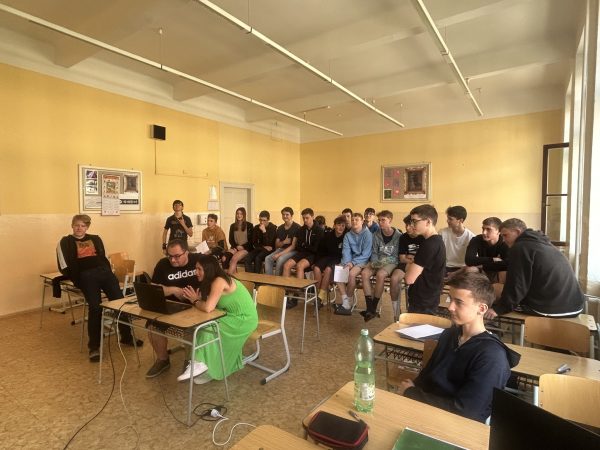
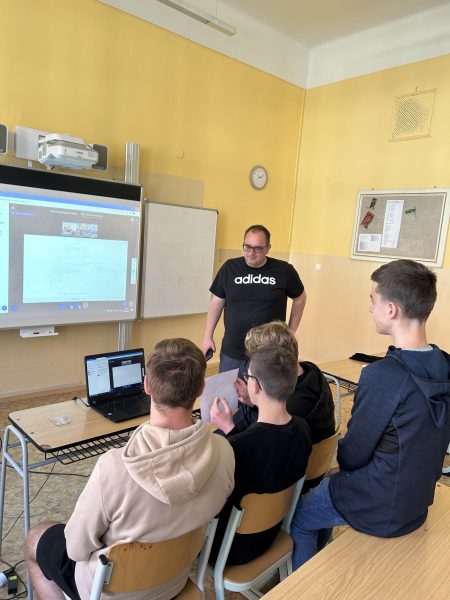
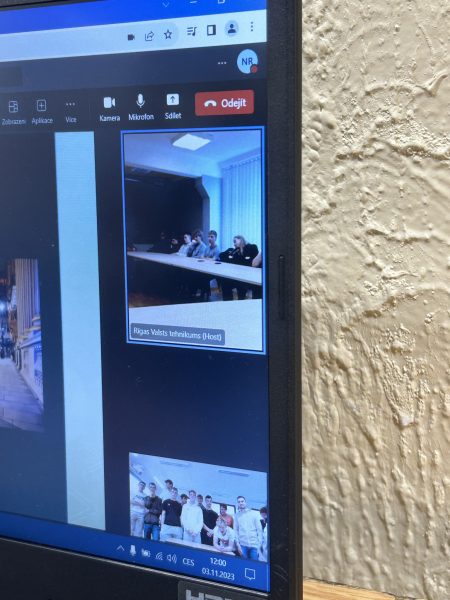
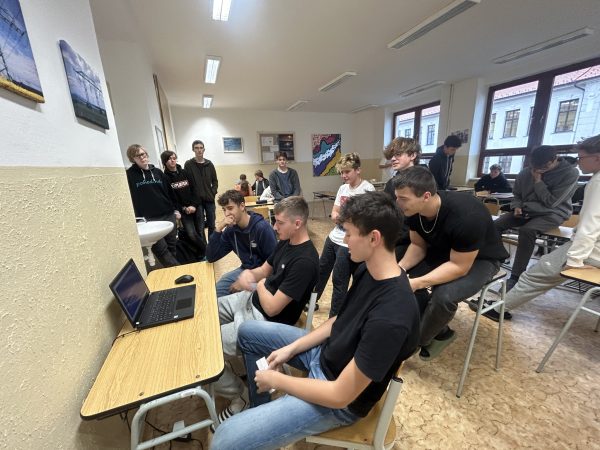
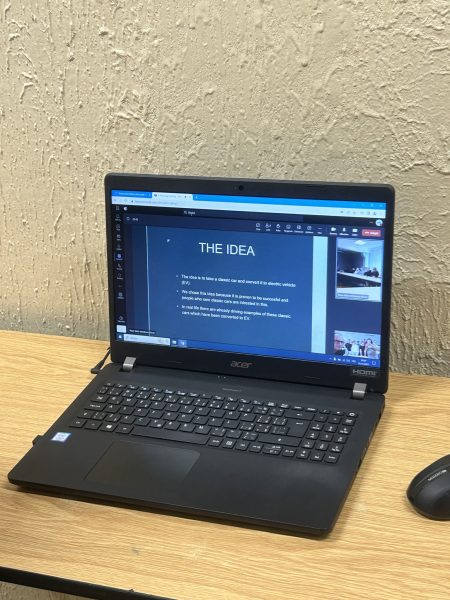
Latvian partner e-Twinning
First online meeting
Second online meeting
Student presentations about school
WP3.1 Hackspace
WP3.1.1 Slavnostní otevření hackspace (28. dubna 2023)
Slavnostní otevření hackspace (28. dubna 2023)
V pátek 28. 4. 2023 od 10:00 proběhlo v dřevodílně naší školy slavnostní otevření první hackspace v Jihočeském kraji (dílny pro širokou veřejnost).
Hackspace SPŠSE vznikl v rámci programu Erasmus+ (název projektu: 2022-1-CZ01-KA210-VET-000082444 Doprava budoucnosti, udržitelná doprava, elektromobilita, vzdělávání pro budoucnost; oblast podpory: Erasmus+ Odborné vzdělávání a příprava – Partnerství pro spolupráci) a jedná se o první hackspace v Jihočeském kraji.
Hackspace je mimo jiné:
- veřejná dílna s různorodým vybavením sloužící k realizaci vlastních projektů,
- inspirativní prostor, kde lidé – jak mladší, tak starší – spolupracují na zajímavých projektech a sdílí své zájmy,
- centrum vzdělávání a předávání si zkušeností.
Uvědomujeme si, že lidé nosí ve svých hlavách spoustu zajímavých nápadů, ale častokrát jim chybí vybavení potřebné pro jejich realizaci. Díky hackspace tak bude moci vzniknout řada zajímavých projektů, a to jak v rámci vzdělávání, tak v rámci volnočasových aktivit. Cílem vytvoření hackspace je rovněž celkově zvýšit zájem o techniku.
Největším „tahákem“ naší dílny je univerzální hrotový soustruh TOS S-28. K dalšímu vybavení hackspace patří stolní vrtačka TOS, dvoukotoučová stolní bruska, pásová pila na kov, úhlová bruska Narex 230 a Narex 125, horkovzdušná pistole, aku vrtačka, široká paleta ručního nářadí Tona Expert, PC sestava společně s 3D tiskárnou, pájecí stanice s mikropájkou, horkovzdušná pájecí stanice, laboratorní digitální napájecí zdroj a multimetr. Dále dílna disponuje stlačeným vzduchem, rozvodem 400 V a 240 V. Dílenské vybavení bude průběžně doplňováno o nové stroje a zařízení. Dílna nebude vybavena spotřebním materiálem, ani materiálem pro výrobu (každý zájemce si musí zajistit vlastní materiál).
Opening ceremony of the hackspace (28 April 2023)
On Friday 28 April 2023 at 10:00 a.m., the first hackspace in the South Bohemia region (workshops for the general public) was opened in the woodshop of our school.
Hackspace SPŠSE was created within the Erasmus+ programme (project name: 2022-1-CZ01-KA210-VET-000082444 Future Transport, Sustainable Transport, Electromobility, Education for the Future; support area: Erasmus+ Vocational Education and Training – Partnership for Cooperation) and it is the first hackspace in the South Bohemian Region.
Hackspace is among others:
- a public workshop with various equipment for the implementation of own projects,
- an inspiring space where people – both young and old – collaborate on interesting projects and share their interests,
- a centre for learning and sharing experiences.
We realise that people have lots of interesting ideas in their heads, but often lack the equipment needed to implement them. Thanks to the hackspace, a number of interesting projects will be able to emerge, both in education and leisure activities. The aim of creating a hackspace is also to increase interest in technology in general.
The biggest “draw” of our workshop is the TOS S-28 universal spindle lathe. Other equipment in the hackspace includes a TOS bench drill, a double disc bench grinder, a band saw for metal, a Narex 230 and Narex 125 angle grinder, a hot air gun, an acoustic drill, a wide range of Tona Expert hand tools, a PC set-up together with a 3D printer, a soldering station with microsolder, a hot air soldering station, a laboratory digital power supply and a multimeter. The workshop also has compressed air, 400 V and 240 V distribution. The workshop equipment will be continuously updated with new machines and equipment. The workshop will not be equipped with consumables or production material (each applicant must provide his own material).
WP3.1.2 Hackspace na Státní technické škole v Rize se otevřelo veřejnosti
Hackspace na Státní technické škole v Rize se otevřelo veřejnosti
Hackspace slouží jako coworkingový prostor pro studenty, jejich rodiče, dospělé studenty z Centra vzdělávání dospělých, učitele a další členy společnosti na Státní technické škole v Rize. Hackspace “Coworking Space” se nachází v Technologickém a inovačním centru (ulice Darzciema 70). Hackspace “Coworking Space” je vybaven potřebnou infrastrukturou pro podporu coworkingových aktivit, včetně stolů, židlí, 30 notebooků, vysokorychlostního internetu a 2 nabíjecích skříní. V budoucnu bude doplněna o kopírku, tiskárnu a 3D tiskárnu. Hackspace “Coworking Space” je pro veřejnost otevřen tři dny v týdnu (úterý, středa a čtvrtek) od 15:00 do 18:00. Pro veřejnost je zdarma. V průměru jej navštěvují 2-3 osoby týdně. Během otevírací doby Hackspace “Coworking Space” je k dispozici jedna odpovědná osoba, která dohlíží na používání technického vybavení a také pomáhá v případě potřeby.
Hackspace “Coworking Space” podporuje smysl pro komunitu mezi jednotlivci pracujícími ve stejném prostoru. To může vést k možnostem navazování kontaktů, spolupráce a sdílení znalostí mezi mladými a dospělými, mezi studenty a učiteli a mezi profesionály a studenty. Lze jej také využít pro workshopy a networkingová setkání, která usnadní interakci mezi studenty z různých kateder, například z katedry energetiky a obchodu. Studenti tak mohou vyvinout některé nové produkty založené na mezioborových kompetencích. Hackspace “Coworking Space” má prostory pro spolupráci, které podporují týmovou práci a projektovou spolupráci mezi členy.
Hackspace at Riga State Technical School
Hackspace is used as a coworking space for students, their parents, adult students from the Adult Education Center, teachers, and other members of the society at Riga State Technical School. The Hackspace “Coworking Space” is located at the Technology and Innovation Center (70 Darzciema Street). Hackspace “Coworking Space” is equipped with the necessary infrastructure to support coworking activities, including desks, chairs, 30 laptops, high-speed internet, and 2 charging cabinets. In the future, it will be supplemented with a copy machine, printer, and 3D printer. Hackspace “Coworking Space” is open to the public three days a week (Tuesday, Wednesday, and Thursday) from 3:00 p.m. to 6:00 p.m. It is free of charge for the public. In average 2-3 persons per week attend it. During the open hours of Hackspace “Coworking Space” there is one responsible person who monitors the use of technical equipment and also helps in case of need.
Hackspace “Coworking Space” fosters a sense of community among individuals working in the same space. This can lead to networking opportunities, collaboration, and knowledge sharing between youngsters and adults, between students and teachers, and between professionals and learners. It also can be used for workshops and networking sessions to facilitate interactions among students from different departments, for example, the energy and commerce department. Thus, students can develop some new products based on interdisciplinary competencies. Hackspace “Coworking Space” has collaborative spaces that encourage teamwork and project collaboration among members.
